This world geography activity challenges kids to use technology to map the Olympic host cities since the Summer Olympics started in 1896.
The Summer Olympic games have been held every four years for the last 125 years. This world map activity includes a list of each of the Olympic games that have been held and the year that they were held.

- Where are the Summer Olympics being held?
- When are the Winter Olympics held?
- How many Olympic Games have been held in the United States?
- Future Olympic Games Host Cities
- How many Olympic Games have been cancelled or delayed?
- History of the Summer Olympics
- How many cities have hosted the Summer Olympic Games more than once?
- Summer Olympic Host Cities
- Map the Olympic Host Cities Geography Activity for Kids
- Meet Toni, the Maker Mom behind Our Family Code
Where are the Summer Olympics being held?
The 2020 Summer Olympics are being held in Tokyo, Japan in 2021. They were originally scheduled to be held in 2020, but due to the Coronavirus pandemic, the games were postponed until the following year.
When are the Winter Olympics held?
The Winter Olympics are held every four years as well, but are staggered with the Summer Olympics. This means that there is an Olympic games to watch every other year. The next Winter Olympics will be held in Beijing, China beginning on February 4, 2022. Beijing will be the first city to have held both the summer and winter Olympic Games.
How many Olympic Games have been held in the United States?
The United States has held the most Olympic Games with a total of eight Olympic Games. The United States has held both Summer and Winter games.
Future Olympic Games Host Cities
The International Olympic Committee (the IOC) has already chosen the next five cities to host upcoming Olympic Games.
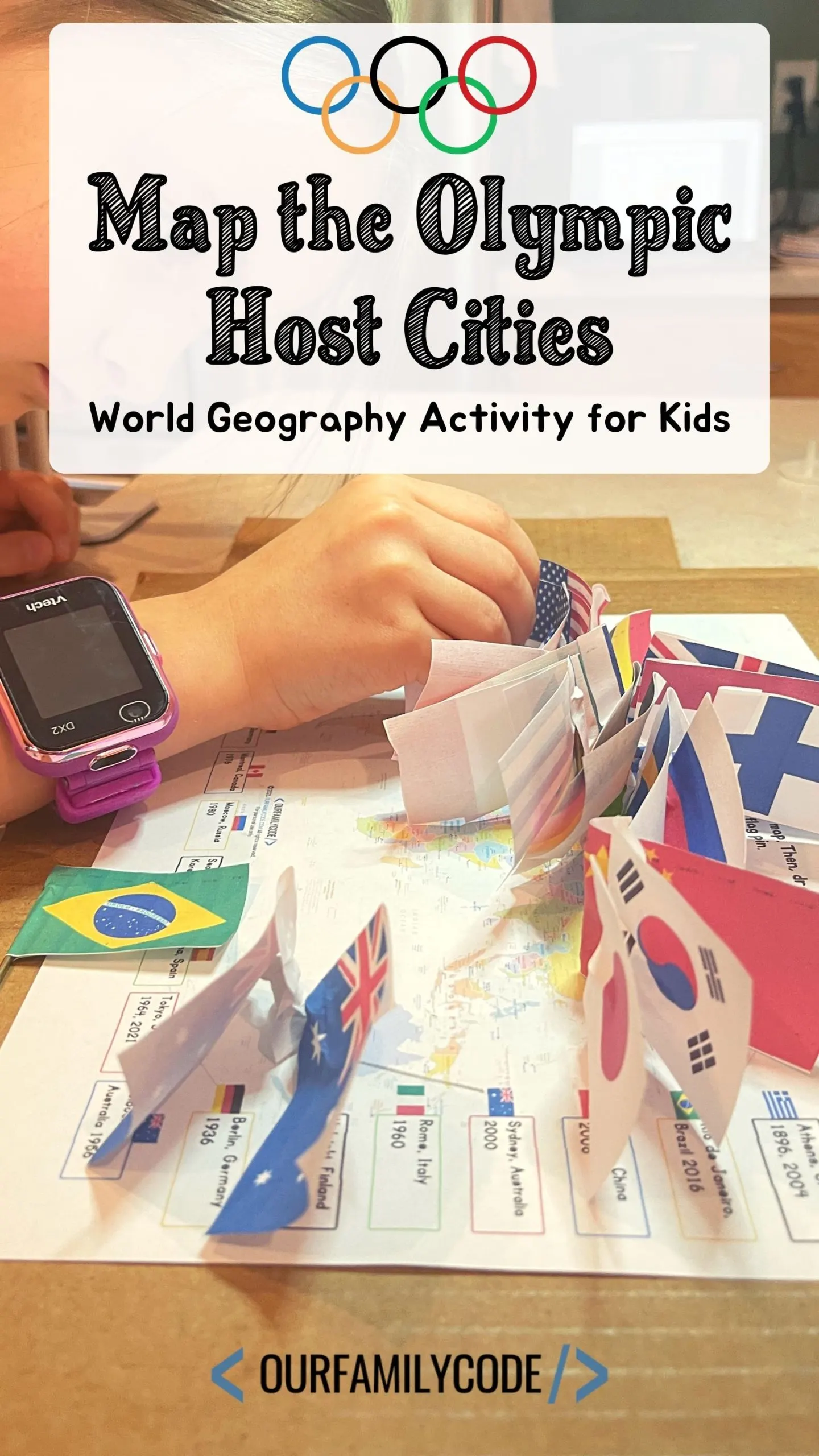
How many Olympic Games have been cancelled or delayed?
Since 1896, there have been five Olympic Games that have been cancelled and one that has been delayed. There were five cancelled Olympic Games that were cancelled due to World War I and World War II.
The International Olympic Committee and Japan chose to delay the 2020 Olympic Games until 2021 due to public health concerns and travel restrictions due to the Coronavirus pandemic.
Cancelled/Delayed Olympic Games
- The 1916 Summer Olympics were awarded to Berlin, Germany and the games were later cancelled due to World War I.
- The 1940 Summer Olympics were originally awarded to Tokyo, Japan and later to Helsinki, Finland. They were ultimately cancelled due to World War II.
- 1940 Winter Olympics were awarded to Sapporo, Japan and later to St. Moritz, Switzerland. The games were eventually cancelled due to World War II.
- The 1944 Summer Olympics were awarded to London, but later cancelled due to World War II.
- The 1944 Winter Olympics were awarded to Cortina d’Ampezzo, Italy, but later cancelled due to World War II.
- The 2020 Summer Olympic Games were awarded to Tokyo, Japan and later delayed until 2021 due to the Coronavirus pandemic.
History of the Summer Olympics
The Modern Olympic Games began in 1896 in Athens, Greece. The Olympics is an international sporting event that features thousands of athletes from around the world that participate in a variety of sporting events. More than 200 nations participate in the Summer Olympics every four years.
The Olympics were inspired by the ancient Olympic Games that were held in Olympia, Greece from the 8th century BC to the 4th century AD.
How many cities have hosted the Summer Olympic Games more than once?
There are 6 cities that have hosted the Summer Olympic Games more than once including:
- Athens, Greece hosted the Olympics in 1896 and 2004.
- Paris France hosted the Olympics in 1900, 1924, and will host again in 2024.
- London, U.K. hosted the Olympics in 1908, 1948, and 2012.
- Tokyo, Japan hosted the Olympics in 1964 and will host the 2020 Olympics in 2021.
- Los Angeles, CA USA hosted the Olympic Games in 1932, 1984, and will host again in 2028.
- Stockholm, Sweden hosted the Olympics in 1912 and the equestrian portion of the Games in 1956.
Summer Olympic Host Cities
Athens, Greece – The 1896 Summer Olympics
The first modern Olympics were held in Athens, Greece in 1896. The 1896 Olympic games brought almost 250 athletes together from fourteen different countries to compete in 43 different events. The games were held in the Panathenaic Stadium.
The United States won the most gold medals with 11 gold and a total of 20 Olympic medals overall. Greece won the second-most gold medals as well as the most overall Olympic medals with 46 total, including 10 gold medals, 17 silver medals, and 19 bronze medals.
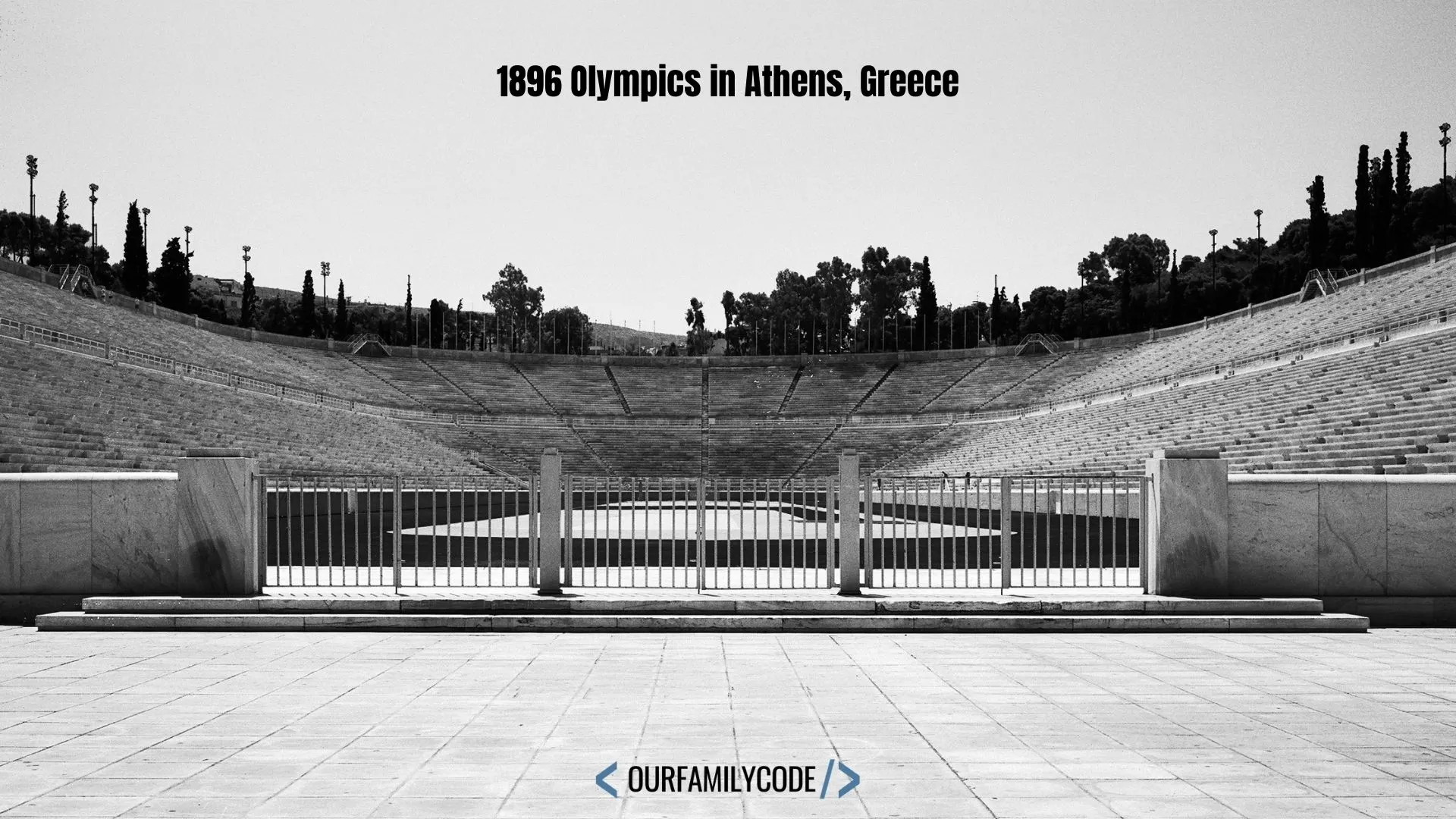
Paris, France – The 1900 Summer Olympics
The second Summer Olympic Games were held in Paris, France in 1900. The 1900 Olympic Games were held during the World’s Fair and were spread out over a five month period from May 14, 1900 to October 28, 1900.
The 1900 Olympics featured almost 1,000 athletes from 24 countries that competed in 95 events. The Olympic Stadium for the 1900 Olympics was the Velodrome de Vincennes. This is also the first Olympics that women competed!
The United States won the second-most Gold medals with 19 gold and a total of 48 Olympic medals overall. France won the most gold medals as well as the most overall Olympic medals with 112 total, including 29 gold medals, 44 silver medals, and 39 bronze medals.
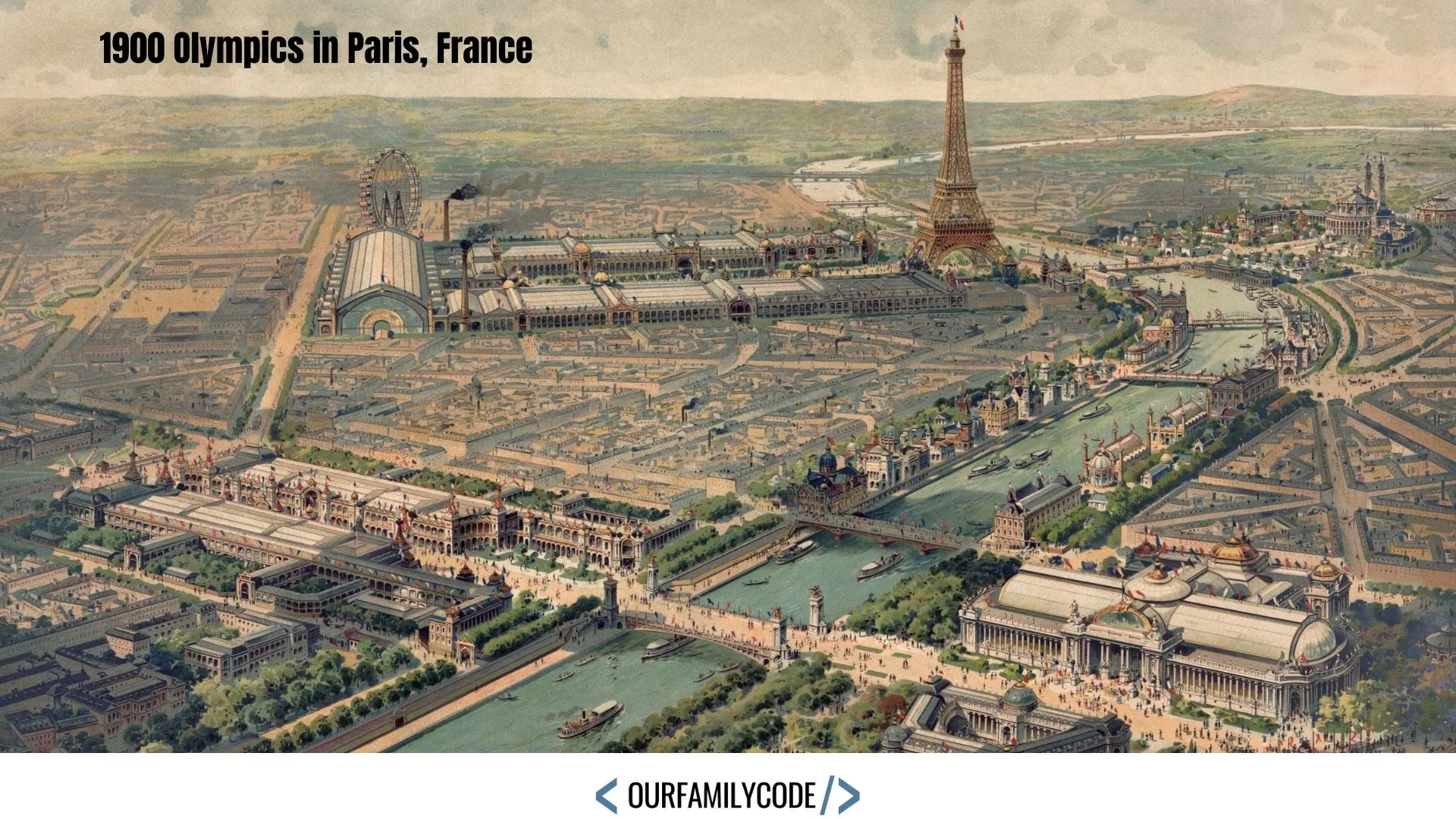
St. Louis, Missouri USA – The 1904 Summer Olympics
The 1904 Olympics were the first Olympic Games to use the three medal format: Gold, Silver, and Bronze. Boxing, Decathalon, freestyle wresting, and weightlifting were added as Olympic events.
The third Olympic Games were held in Francis Field stadium in St. Louis, Missouri. This was the first Olympic Games to be held in the United States. The games featured more than 650 athletes from 12 countries competing in 95 events.
The United States won the most gold medals with 78 gold and a total of 239 Olympic medals overall.
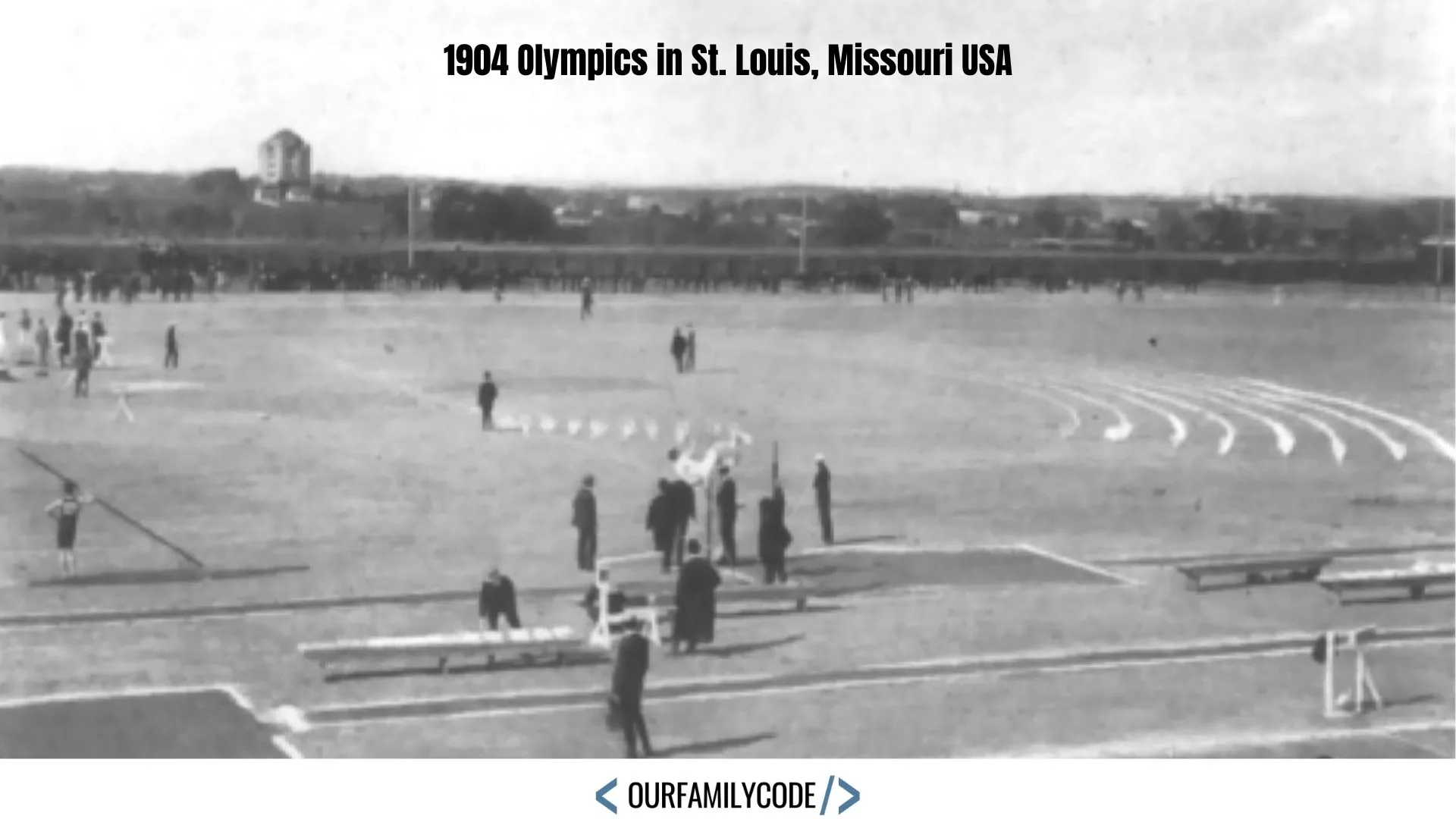
Public Domain – United States
London, Great Britain – The 1908 Summer Olympics
The fourth Summer Olympic Games were held in London in 1908. The 1908 Olympic Games were originally scheduled to take place in Rome, but the eruption of Mount Vesuvius caused the venue to change to London.
The 1908 Olympics hosted 2,008 athletes from 22 participating countries that competed in 110 events. This Olympic games featured the first opening ceremony parade of athletes walking behind their national flag.
The United States won the second-most gold medals with 23 gold and a total of 47 Olympic medals overall. Great Britain won the most gold medals as well as the most overall Olympic medals with 146 total, including 56 gold medals, 51 silver medals, and 39 bronze medals.
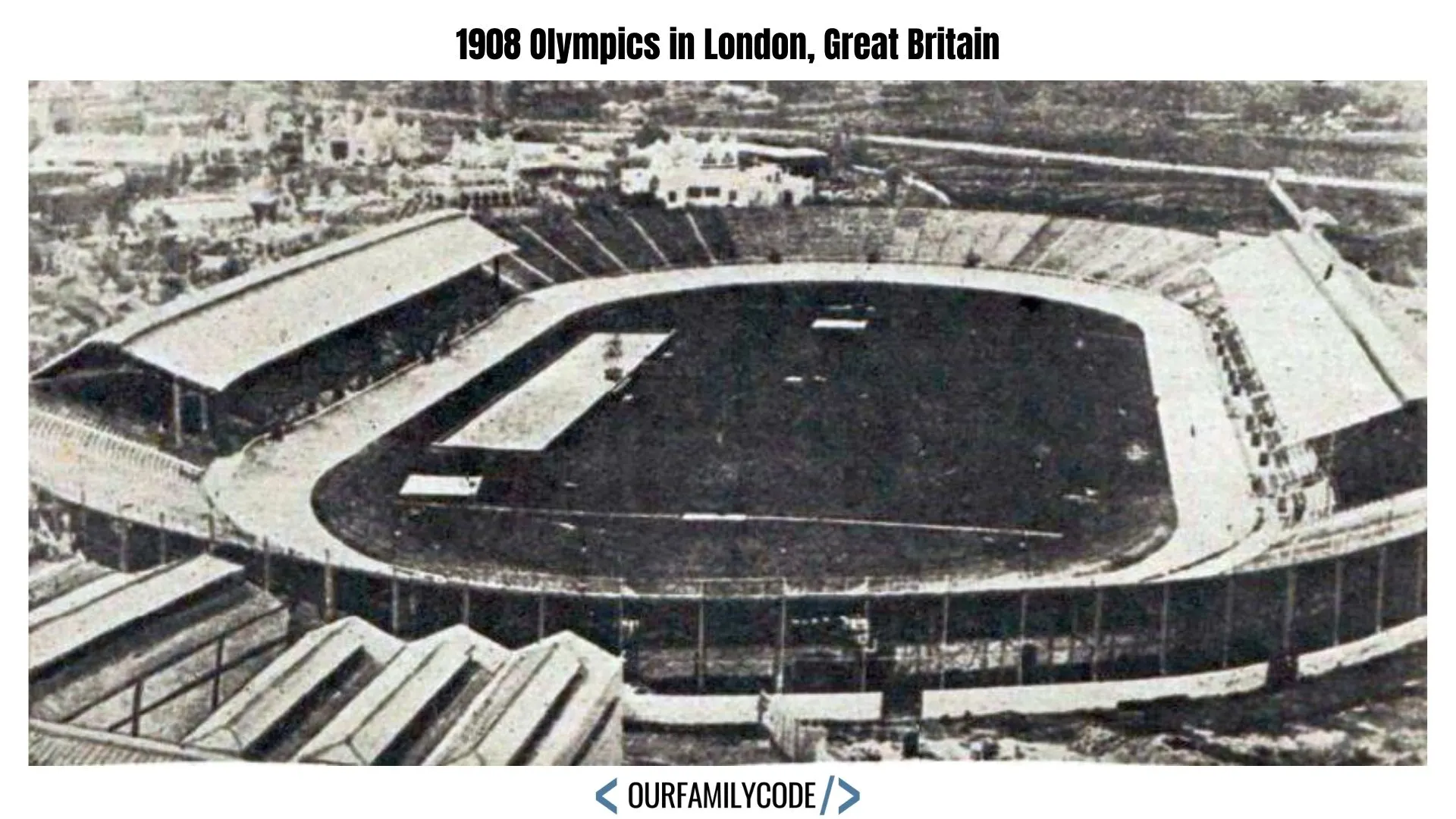
Public Domain – United States & France
Stockholm, Sweden – The 1912 Summer Olympics
The fifth Olympic Games were held in Stockholm, Sweden in 1912. The 1912 Summer Olympics featured more than 2,400 athletes from 28 participating countries who competed in more than 100 events. This is the first Olympic Games that featured athletes from five continents.
The United States won the most gold medals with 25 gold and a total of 63 Olympic medals overall. Sweden won the second-most gold medals and the most overall Olympic medals with 65 total, including 24 gold medals, 24 silver medals, and 17 bronze medals.
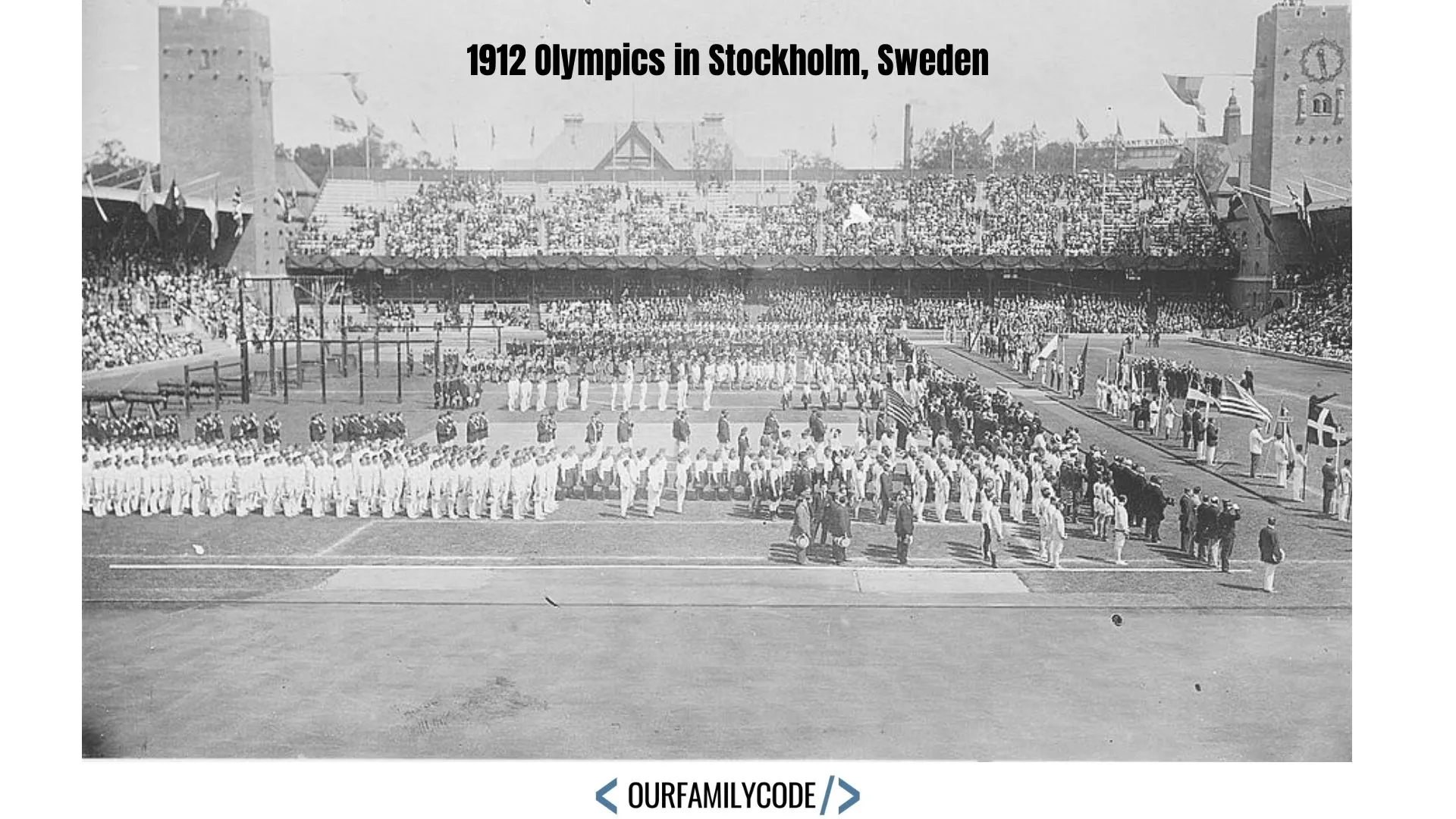
Berlin, Germany – The 1916 Summer Olympics
The sixth Olympic Games were scheduled to occur in Berlin, Germany in 1916. The games were cancelled due to WWI.
Antwerp, Belgium – The 1920 Summer Olympics
The 1920 Olympic Games were held in Antwerp, Belgium after eight years due to the disruption of the First World War. This is the first Olympics that featured the Olympic flag with five rings designed to symbolize the universality of the Games.
More than 2,600 athletes from 29 participating countries competed in 156 events. The United States won the most gold medals with 41 gold and a total of 95 Olympic medals overall.
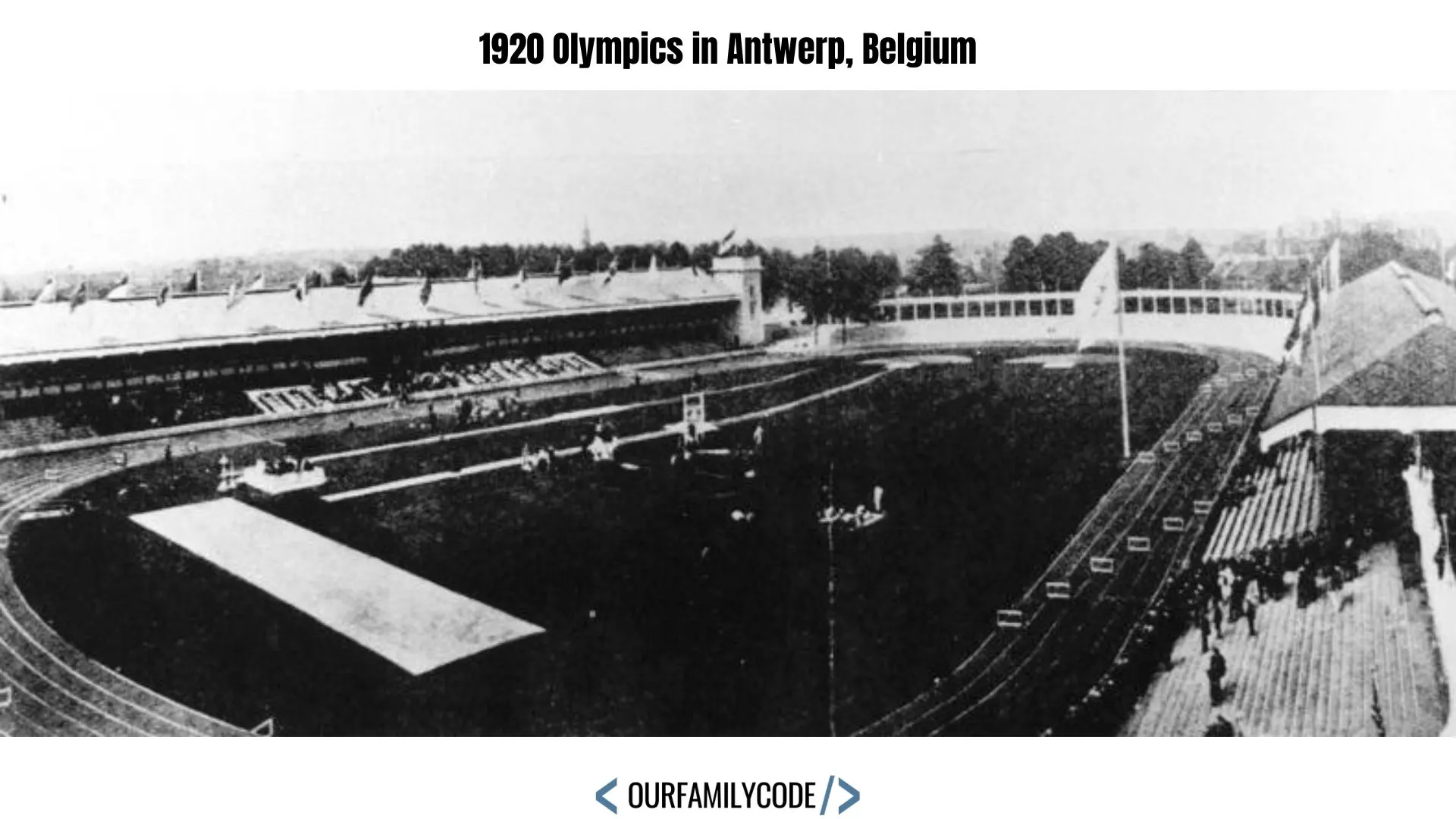
Public Domain – United States
Paris, France – The 1924 Summer Olympics
Paris became the first city to host two Olympic Games when it hosted the eighth Summer Olympics in 1924. These Games were the first to hold a Closing Ceremony and display three flags in the Stadium: one from the International Olympic Committee, one from the host country, and one from the next host country.
An Olympic Village of wooden cabins was built specifically to house the almost 3,100 athletes from 44 participating countries. The Paris 1924 Olympics held 126 events with the Stade Olympique Yves-du-Manoir as the main venue for the Games.
The United States won the most gold medals with 45 gold and a total of 99 Olympic medals overall.
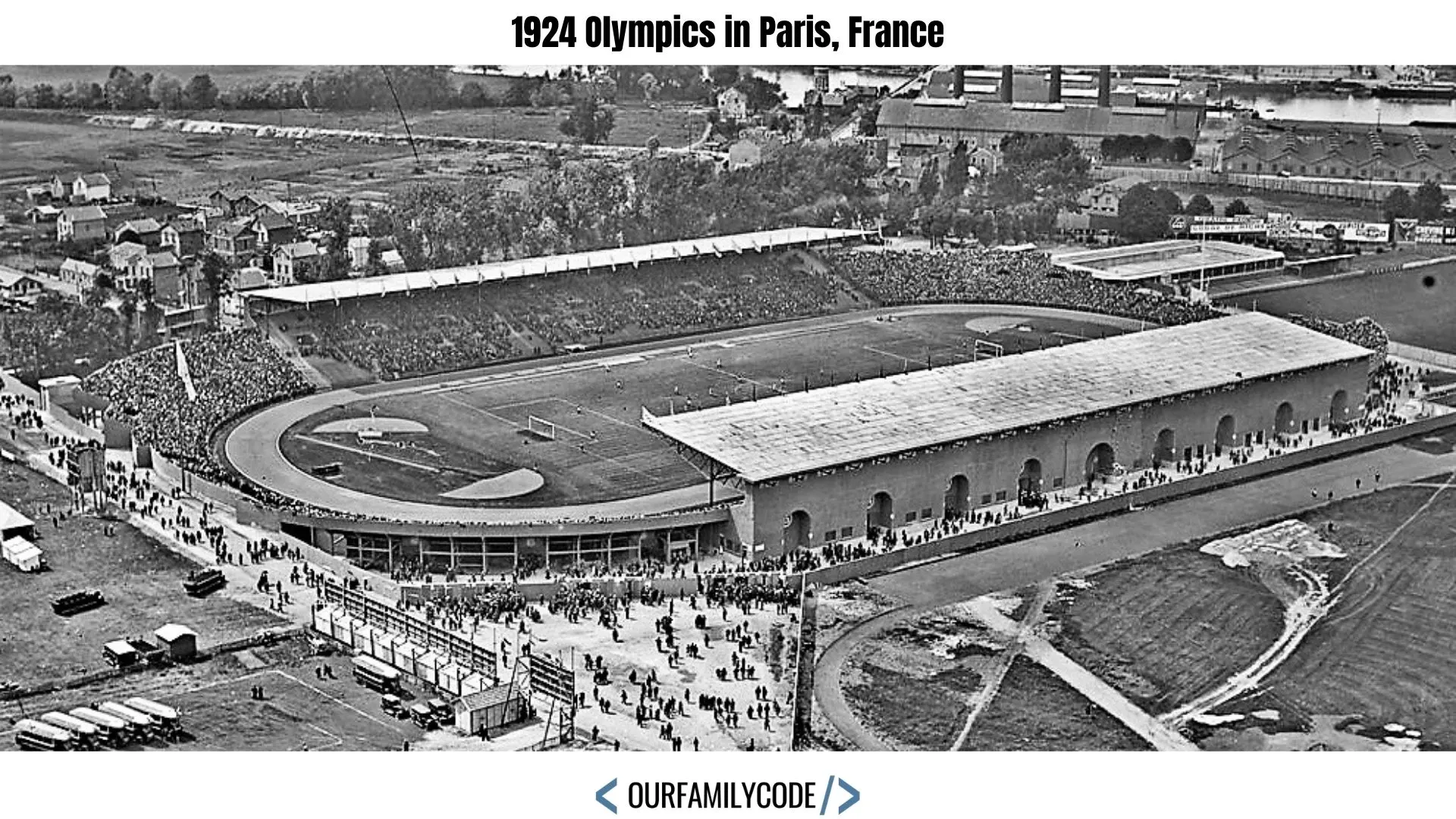
Amsterdam, Netherlands – The 1928 Summer Olympics
The 1928 Summer Olympics were held in Amsterdam, Netherlands from May 17th to August 12. The Amsterdam Games were the first time that a symbolic flame was lit during the Games. The flame burned in a cauldron located at the top of the Olympic Stadium.
The Games featured more than 2,800 athletes from 46 countries who competed in 109 events.
The United States won the most gold medals with 22 gold and a total of 56 Olympic medals overall.
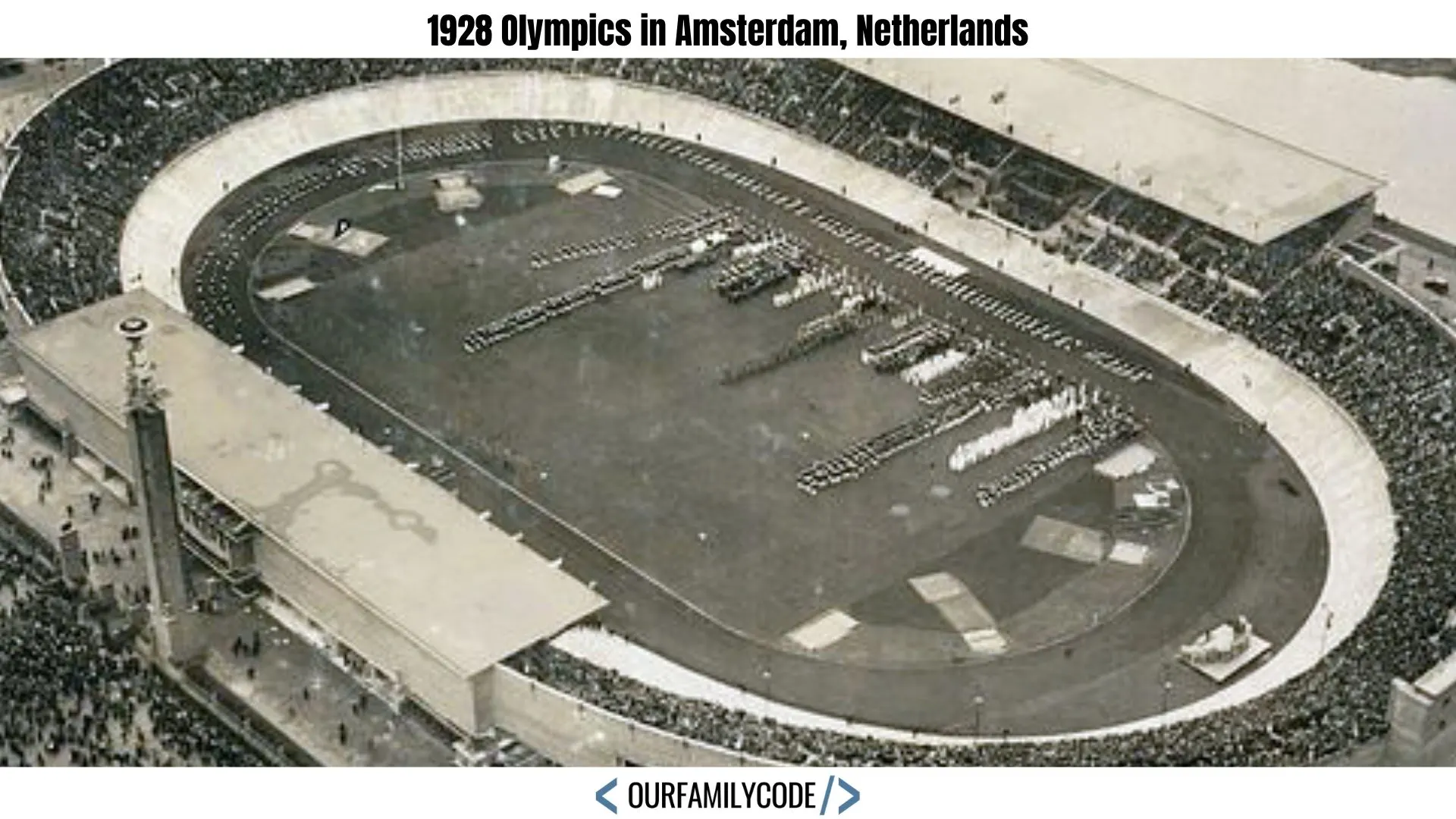
Los Angeles, California USA – The 1932 Summer Olympics
The 10th Summer Olympics were held in Los Angeles, California in 1932. This was the first Olympic Games to have a duration of 16 days set. The Games brought more than 100,000 spectators to the opening ceremony at the Coliseum Olympic Stadium.
The 1932 Summer Olympics featured 1,334 athletes from 37 participating countries and awarded medals in 117 events.
The United States won the most gold medals with 41 gold and a total of 103 Olympic medals overall.
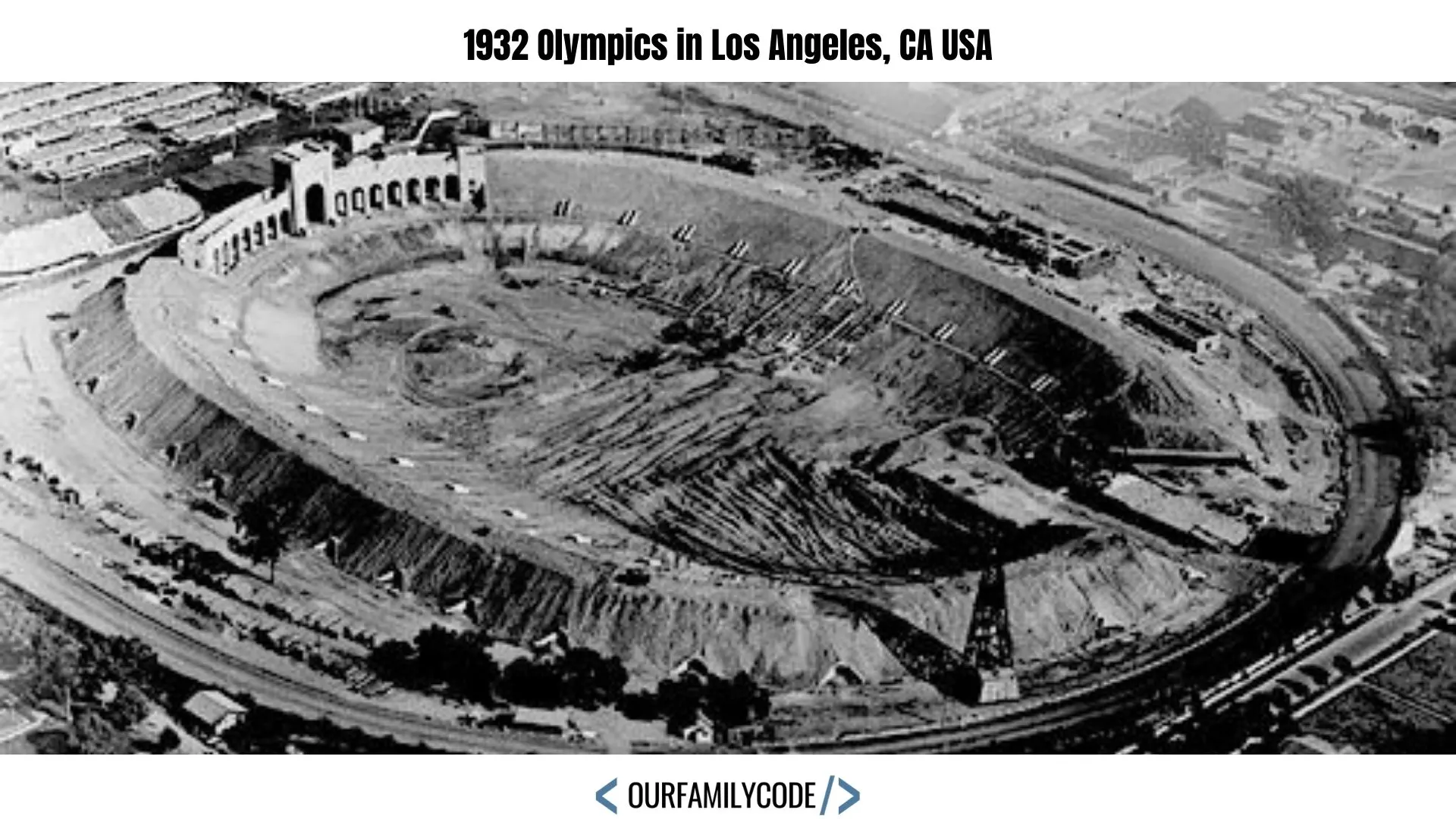
Berlin, Germany – The 1936 Summer Olympics
The 11th Summer Olympic Games were held in Berlin, Germany. The Torch Relay began with the 1936 Summer Olympics with a flame that was lit at the ancient Olympic site in Olympia, Greece and passed hand-to-hand until it reached the Olympiastadion in Berlin, Germany.
Despite attempted politicalization by Adolf Hitler, the Games showcased Team USA’s Jesse Owens, who won four gold medals. The 1936 Olympics were also the first Games to be filmed and broadcast to places around Berlin to allow the public to view the events.
The United States won the second-most gold medals with 24 gold and a total of 56 Olympic medals overall. Germany won the most gold medals as well as the most overall Olympic medals with 89 total, including 33 gold medals, 26 silver medals, and 30 bronze medals.
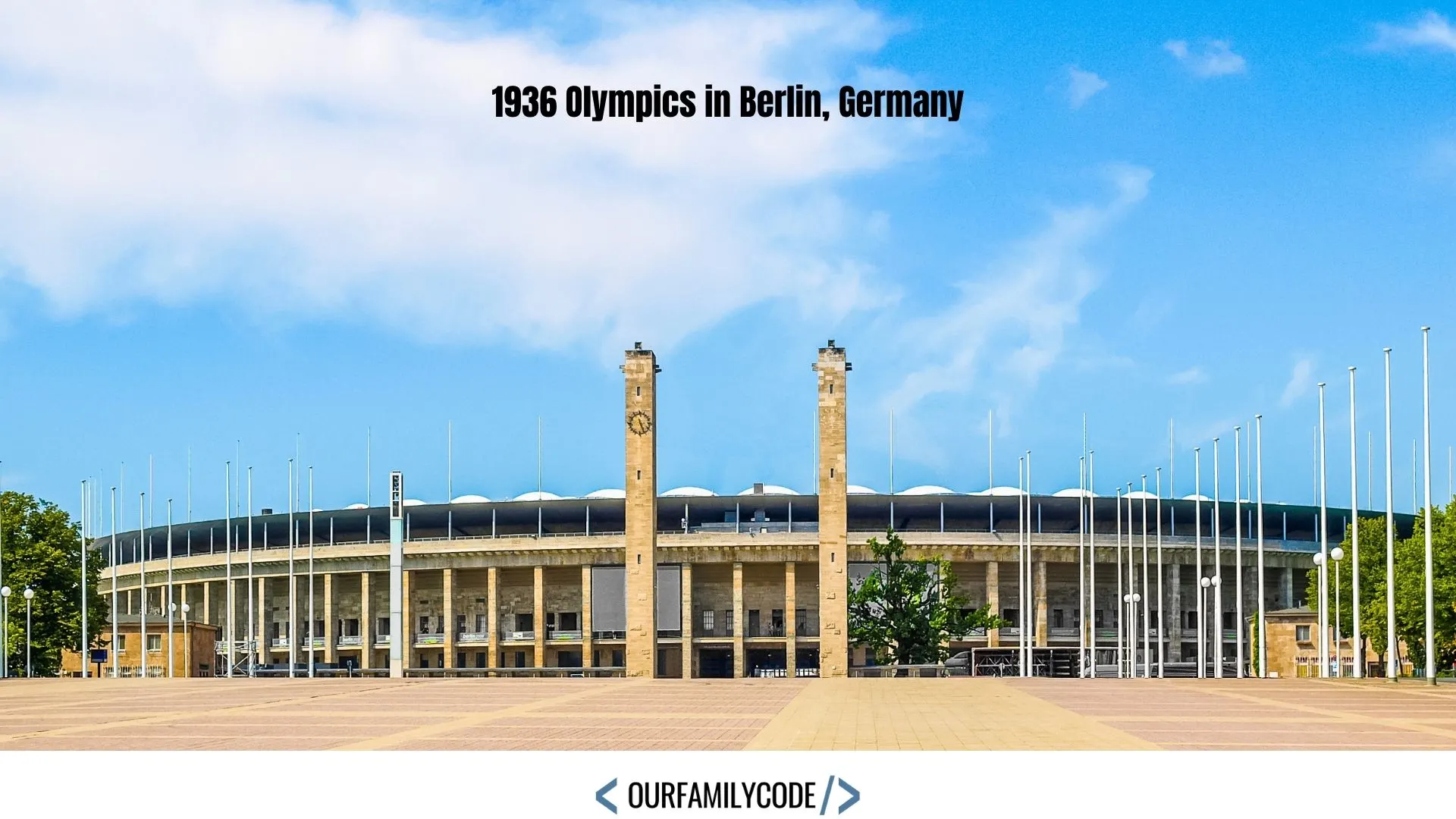
Helsinki, Finland – The 1940 Summer Olympics
The 12th Summer Olympic Games were originally scheduled to be played in Tokyo, Japan in 1940. The games were moved to Helsinki, Finland and later cancelled due to WWII. Helsinki eventually hosted the 1952 Summer Olympics.
London, Great Britain – The 1944 Summer Olympics
The 1944 Summer Olympic Games were scheduled to be played in London, Great Britain. The games were cancelled due to World War II.
London, Great Britain – The 1948 Summer Olympics
London held the 1948 Summer Olympic Games after the previous Summer Games were cancelled due to World War II. The London Games featured 4,104 athletes from 59 participating countries that competed in more than 135 events.
The 1948 Games were the first to be televised by BBC television to the London area. The United States won the most gold medals with 38 gold and a total of 84 Olympic medals overall.
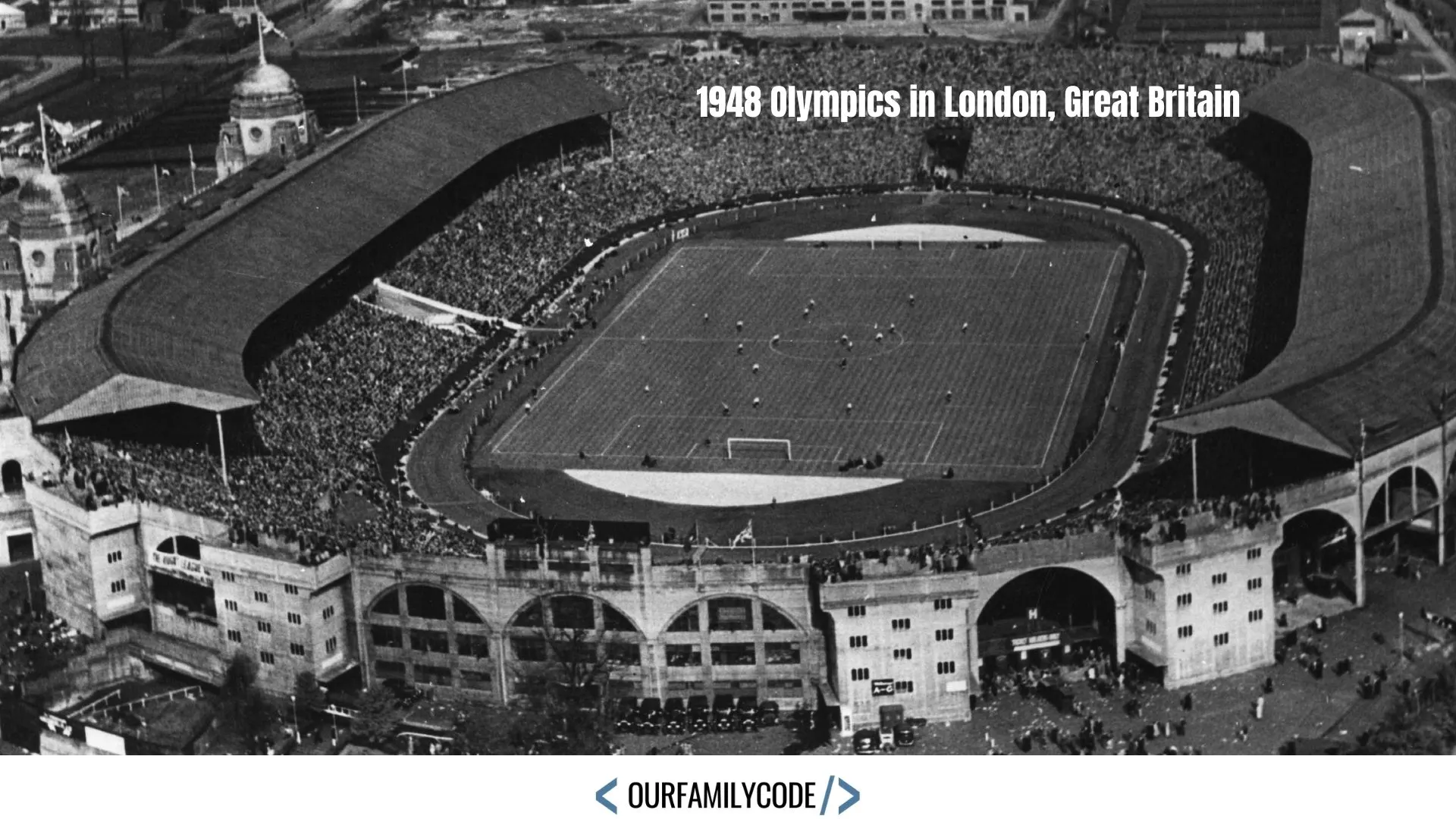
Helsinki, Finland – The 1952 Summer Olympics
Helsinki, Finland held the 15th Summer Olympics in 1952 after its first bid at hosting the Games was cancelled due to WWII in 1940. The Helsinki Olympics were the first Olympics that the USSR competed in. The USSR placed second behind the USA.
These Games featured almost 5,000 athletes from 69 countries and awarded medals in 149 events including equestrian sports that evolved to allow women and men compete alongside in the mixed events.
The United States won the most gold medals with 40 gold and a total of 76 Olympic medals overall.
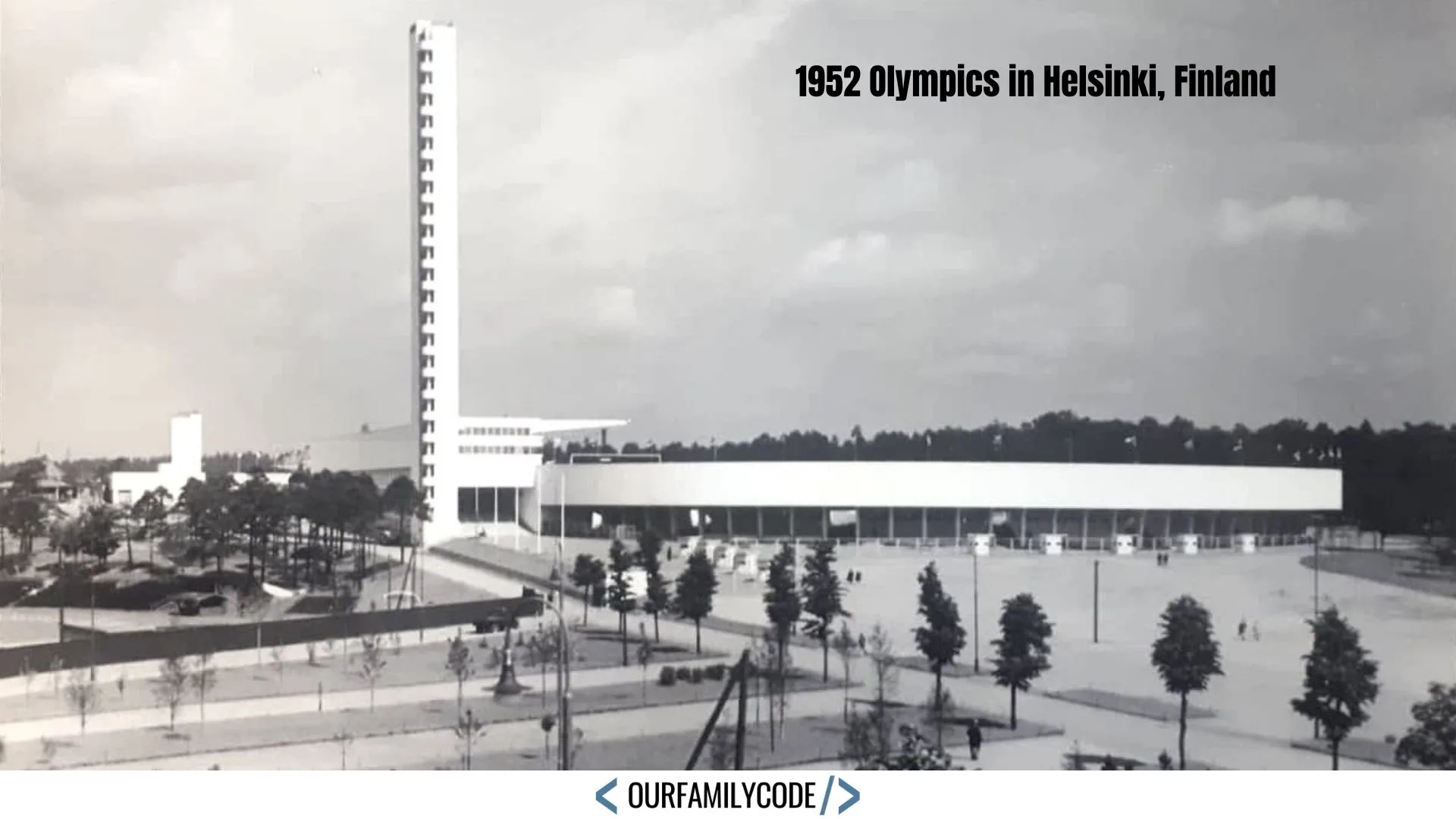
Melbourne, Australia – The 1956 Summer Olympics
The 16th Summer Olympic Games were held in Melbourne, Australia in 1956 with the exception of the equestrian events. The equestrian events were held in Stockholm, Sweden because Australian veterinary rules forbade the entry of foreign horses.
The 1956 Summer Olympics were the first Games to be held in Oceania. These Games featured more than 3,300 athletes from 72 participating countries and awarded medals in 151 events.
The United States won the second-most gold medals with 32 gold and a total of 74 Olympic medals overall. The Soviet Union won the most gold medals as well as the most overall Olympic medals with 98 total, including 37 gold medals, 29 silver medals, and 32 bronze medals.
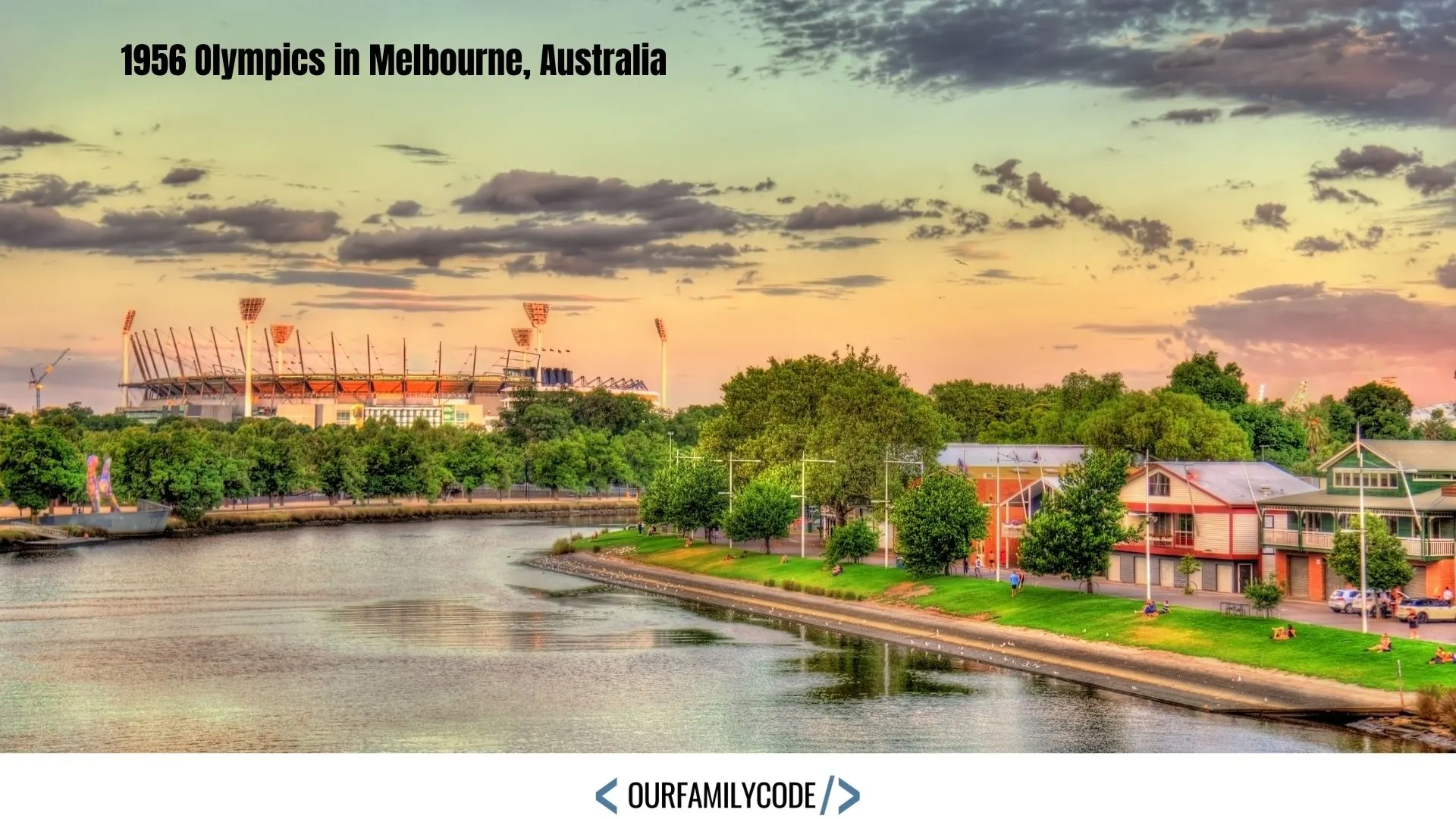
Rome, Italy – The 1960 Summer Olympics
The 17th Summer Olympic Games were held in Rome, Italy in 1960. Boxer Cassius Marcellus Clay from Team USA won gold in the light-heavyweight category. Clay later changed his name to Muhammad Ali.
The 1960 Summer Olympics hosted 83 participating countries with more than 5,300 athletes that competed in 150 events. The Games are remembered for their blend of sport and Olympic culture as well as the historic setting for the competition.
The United States won the second-most gold medals with 34 gold and a total of 71 Olympic medals overall. The Soviet Union won the most gold medals as well as the most overall Olympic medals with 103 total, including 43 gold medals, 29 silver medals, and 31 bronze medals.
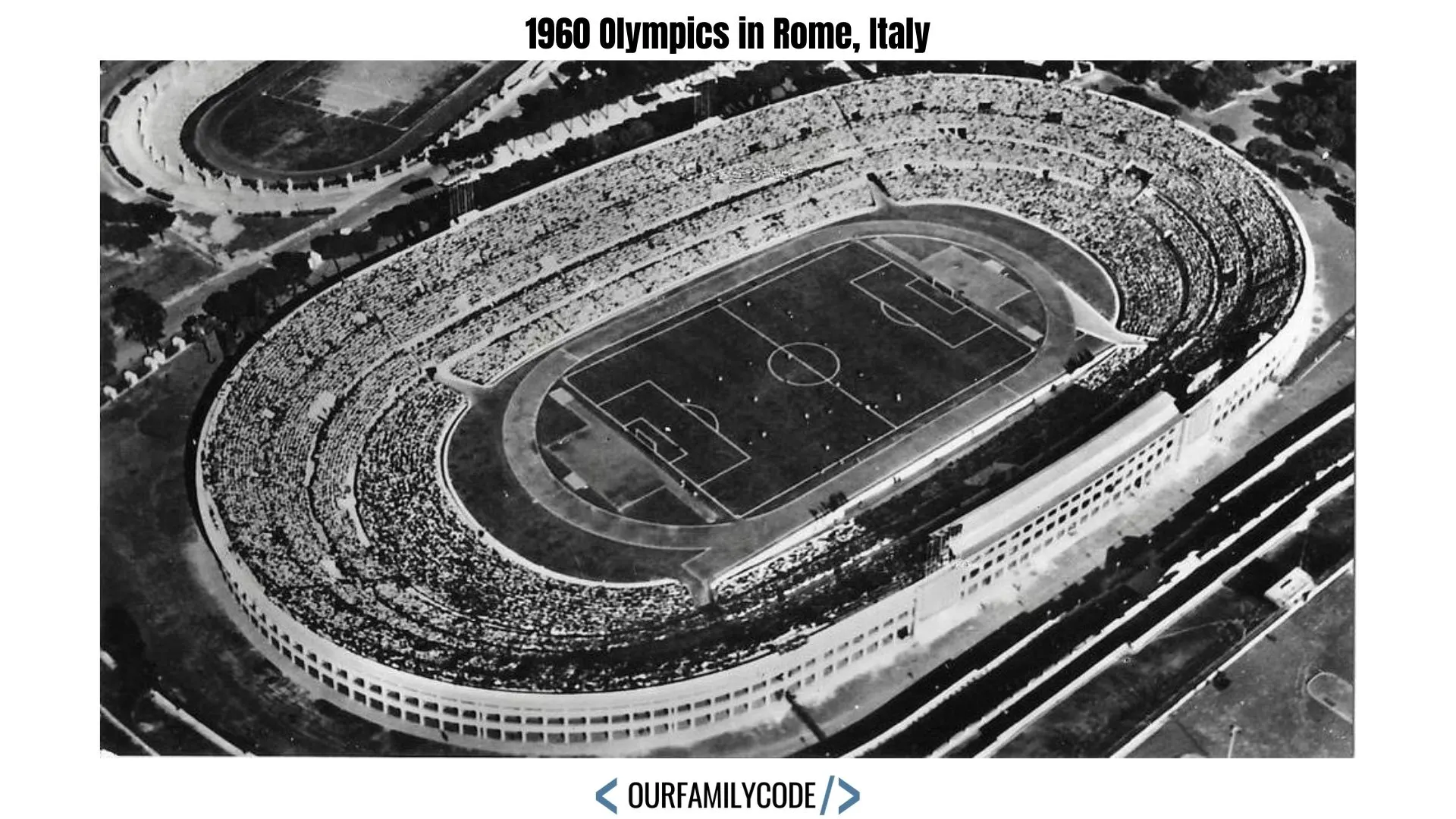
Tokyo, Japan – The 1964 Summer Olympics
The 1964 Summer Olympics were held in Tokyo, Japan. These Games were the 18th Olympic Games and featured 5,152 athletes from almost 100 countries and awarded medals in 163 events. These events included Men’s Judo, Men’s Volleyball, and Women’s Volleyball for the first time.
The United States won the most gold medals with 36 gold and a total of 90 Olympic medals overall. The Soviet Union won the most overall Olympic medals with 96 total, including 30 gold medals, 31 silver medals, and 35 bronze medals.
The 1964 Olympic Games were the first to be broadcast internationally. Famous architect Kenzo Tange designed the Yoyogi National Gymnasium for these events. It was the 1964 Olympics that started the trend of designing Olympic sports pictograms.
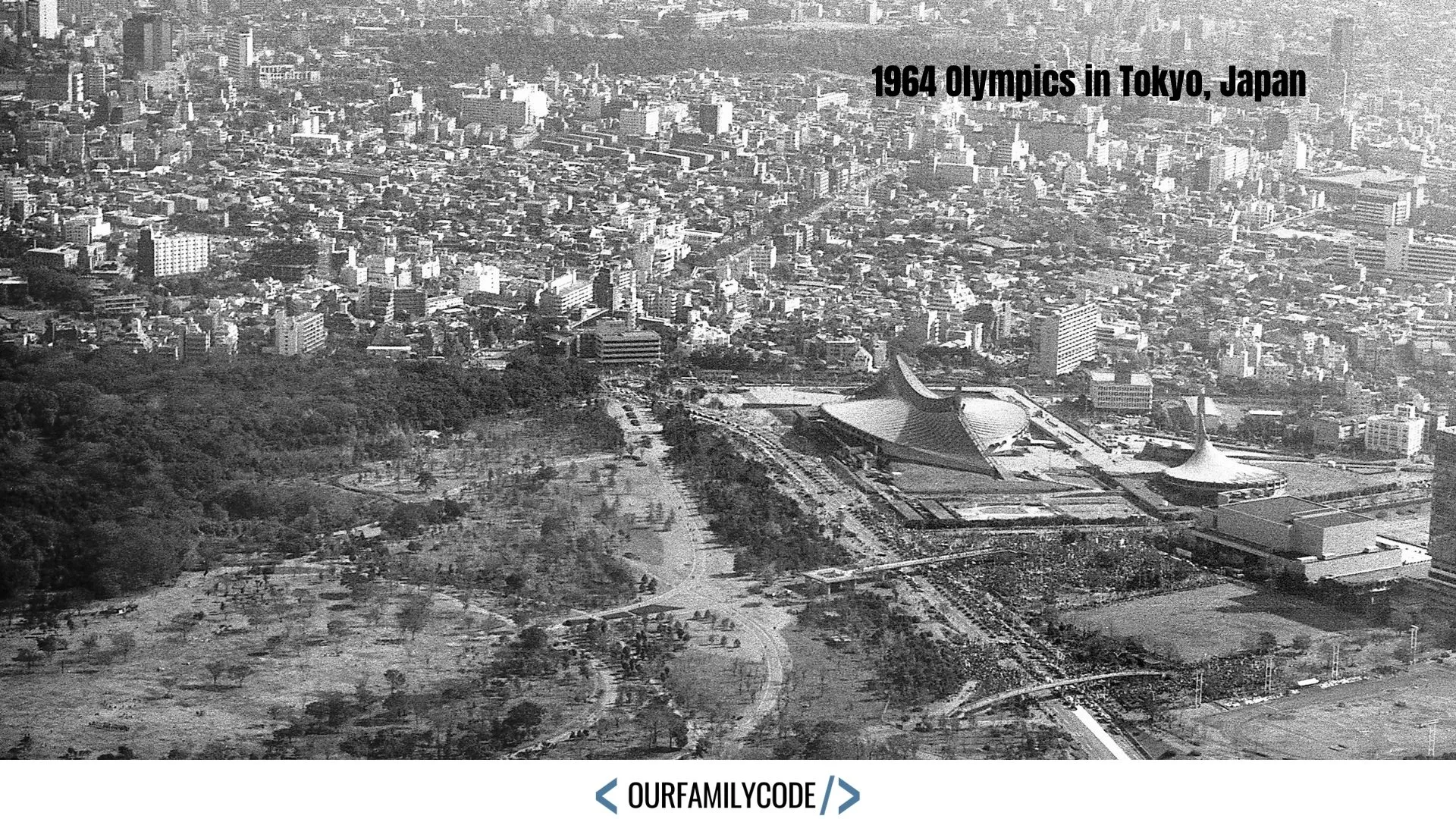
Mexico City, Mexico – The 1968 Summer Olympics
The 19th Olympic Games were awarded to Mexico City, Mexico and were the first Olympic Games to be held in Latin America. These Games were the first to use a Tartan track for its athletics events held at Estadio Olimpico Universitario.
A memorable moment of the 1968 Summer Olympic Games was when Americans Tommie Smith and John Carlos, gold and silver medalists for the 200m, raised their fists and lowered their heads as the national anthem was played to demonstrate against racial segregation in the USA.
The United States won the most gold medals with 45 and a total of 107 Olympic medals overall.
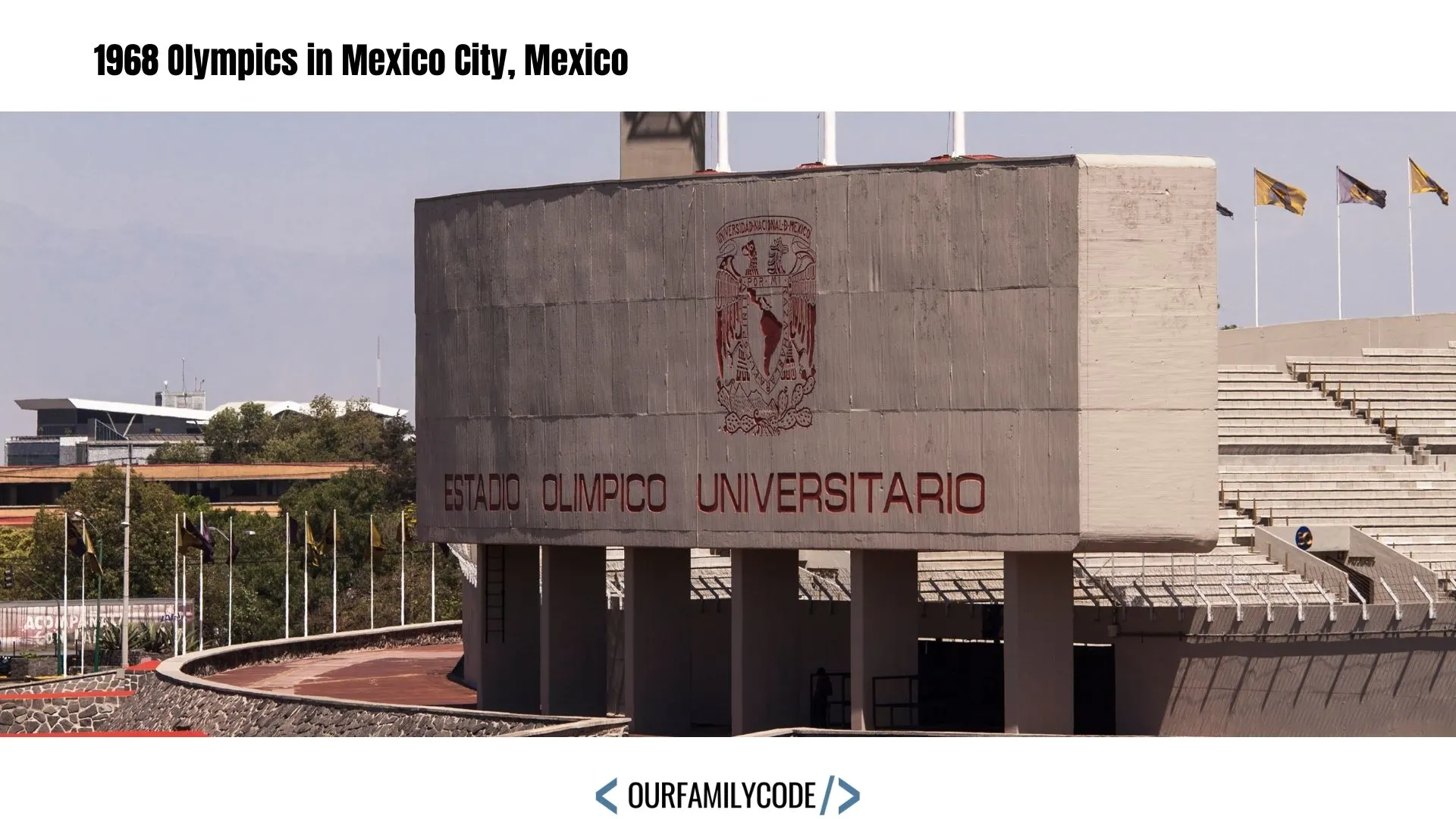
Munich, Germany – The 1972 Summer Olympics
The 1972 Summer Olympic Games were held in Munich, Bavaria, West Germany and were the second Olympic Games to be held in Germany. The Games included 7,134 athletes from 121 participating countries and awarded medals in 195 events.
The Olympic Park “Olympiapark” was designed by architect Gunther Behnisch with canopies of acrylic glass held by metal ropes. The design of the Olympic Park were considered revolutionary.
The United States won the second-most gold medals with 33 gold and a total of 94 Olympic medals overall. The Soviet Union won the most gold medals as well as the most overall Olympic medals with 99 total, including 50 gold medals, 27 silver medals, and 22 bronze medals.
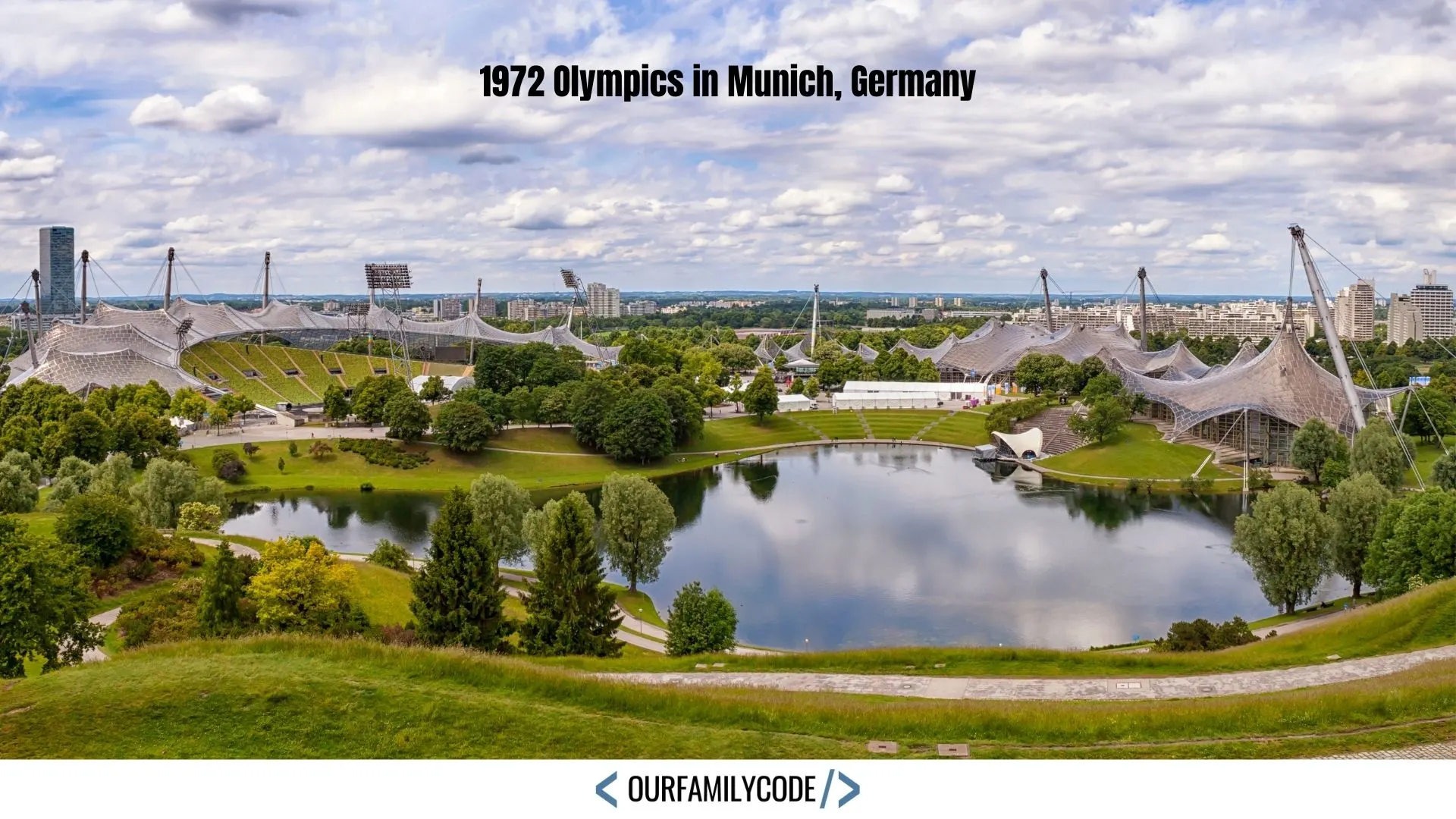
Montreal, Canada – The 1976 Summer Olympics
The 21st Olympic Games were held in Montreal, Canada in 1976. The 1976 Summer Olympics added Women’s basketball, rowing, handball events to the Olympic program. The Games featured more than 6,000 athletes from 92 countries and awarded medals in 198 events.
Nadia Comaneci, a 14-year-old Romanian gymnast earned the first ever maximum score of 10.0 points on the uneven bars.
The United States ranked third with 34 gold medals and a total of 94 Olympic medals overall. The Soviet Union won the most gold medals as well as the most overall Olympic medals with 125 total, including 49 gold medals, 41 silver medals, and 35 bronze medals. East Germany ranked second with 40 gold medals, 25 silver medals, and 25 bronze medals.
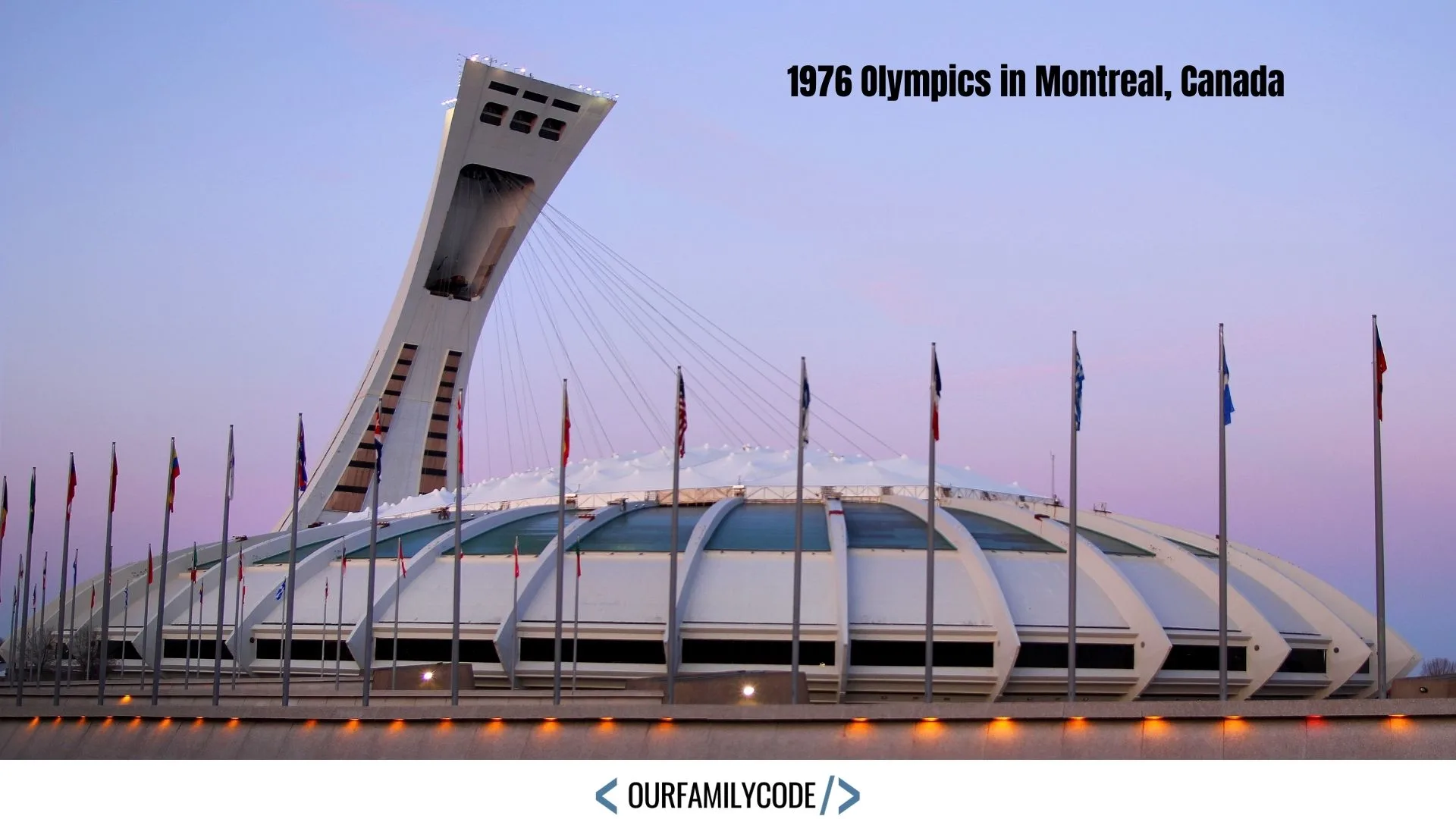
Moscow, Russia – The 1980 Summer Olympics
The XXII Olympic Games were held from July 19, 1980 to August 3, 1980 in Moscow, Soviet Union, in present-day Russia. The 1980 Summer Olympics were the first Games to be held in Eastern Europe and the first Games to be held in a communist country.
The 1980 Olympics were overshadowed by a boycott initiated by the United States that was aimed at protesting against the invasion of Afghanistan by Soviet Troops. 65 countries and regions invited to the Games did not participate due to the boycott.
The Games hosted 5,179 athletes from 80 participating countries and awarded medals in 203 events. Aleksandr Dityatin from the Soviet Union became the first athlete to win eight medals at one Olympic Games.
The Soviet Union won the most gold medals as well as the most Olympic medals overall with 196 total medals, including 80 gold medals, 69 silver medals, and 46 bronze medals.
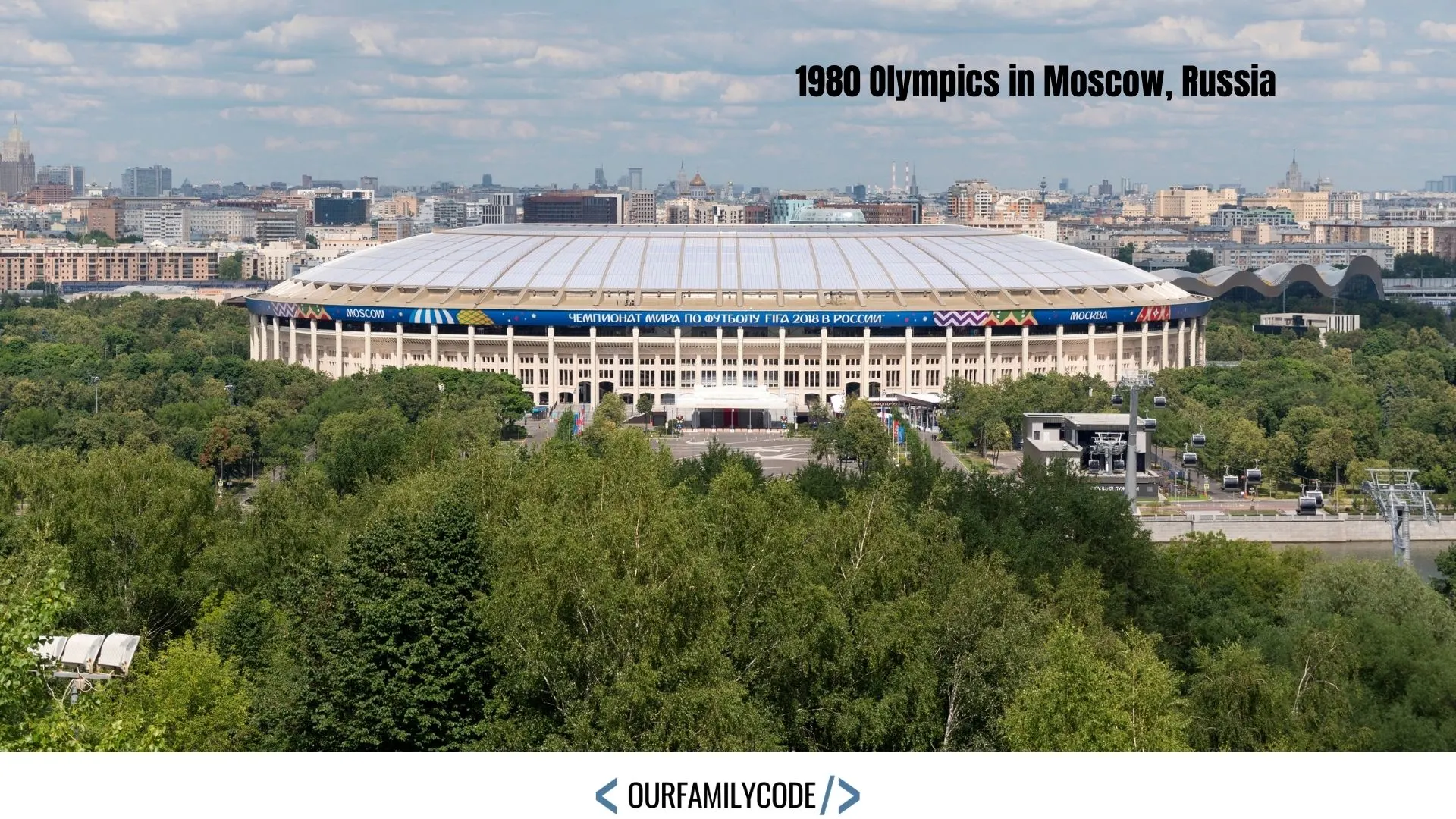
Los Angeles, California USA – The 1984 Summer Olympics
The XXIII Summer Olympics were held in Los Angeles, California from July 28 to August 12, 1984. This was the second Olympic Games to be awarded to Los Angeles. The 1984 Games were boycotted by fourteen Eastern countries including the Soviet Union and East Germany in response to the boycott of the 1980 Summer Olympics that was led by the United States.
Carl Lewis from Team USA made history and matched the record that fellow American, Jess Owens, set in Berlin by winning gold medals in the 100m, 200m, 4x100m relay, and the long jump. The USA’s Joan Benoit won the first women’s Olympic marathon.
The Games featured 6,829 athletes from 140 participating countries and awarded medals in 221 events.
The United States won the most gold medals as well as the most Olympic medals overall with 174 medals, including 83 gold medals, 61 silver medals, and 30 bronze medals.
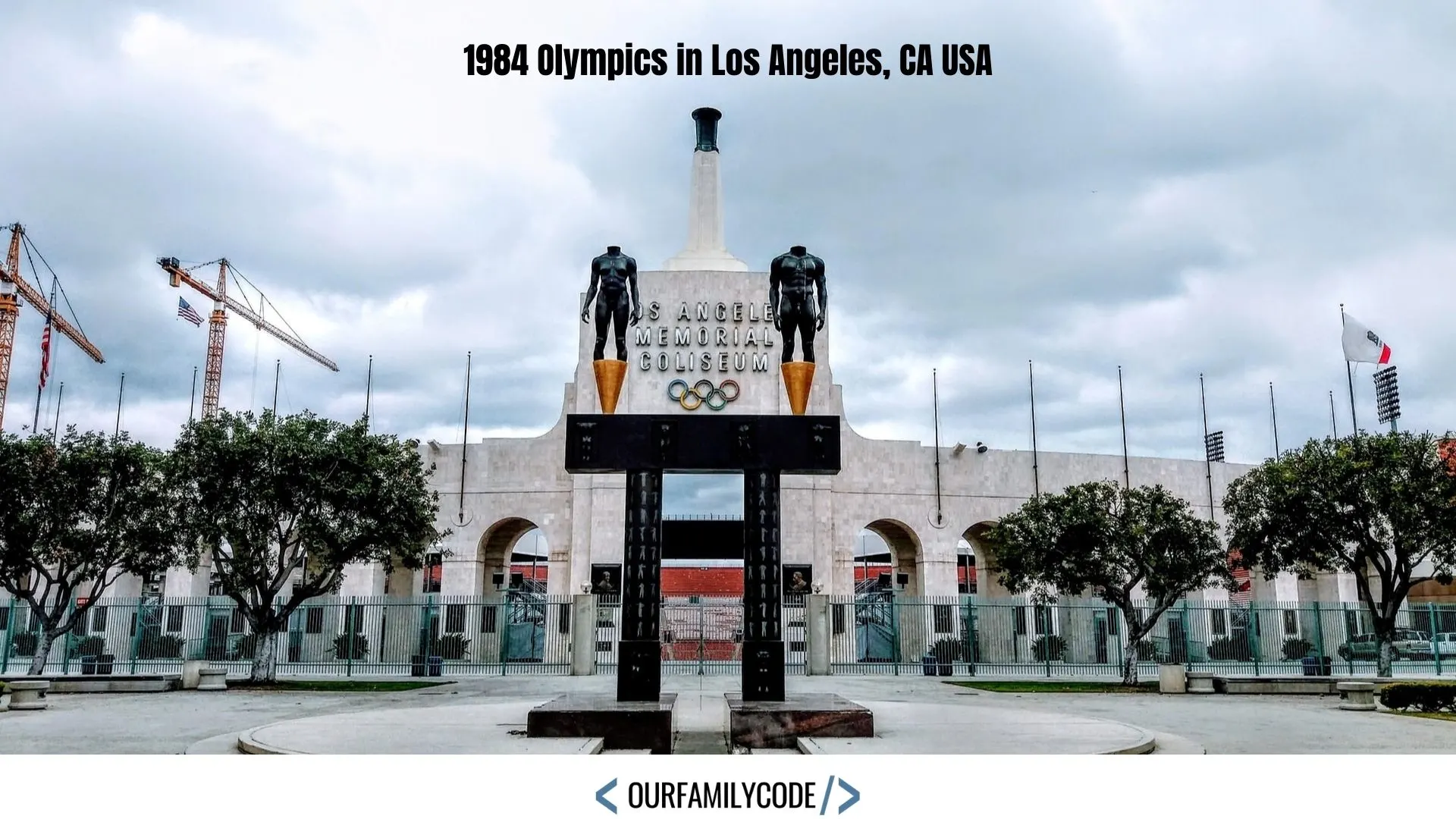
Seoul, South Korea – The 1988 Summer Olympics
The XXIV Olympic Games were held from September 17 to October 2, 1988 in Seoul, South Korea. The 1988 Summer Olympics featured 8,397 athletes from 159 participating countries and awarded medals in 237 events.
These Games were the first time that women filled the three steps of the podium for the dressage event winning gold, silver, and bronze in this equestrian event.
The United States ranked third with 36 gold medals and a total of 94 Olympic medals overall. The Soviet Union won the most gold medals as well as the most overall Olympic medals with 132 total, including 55 gold medals, 31 silver medals, and 46 bronze medals. East Germany ranked second with 37 gold medals, 35 silver medals, and 30 bronze medals.
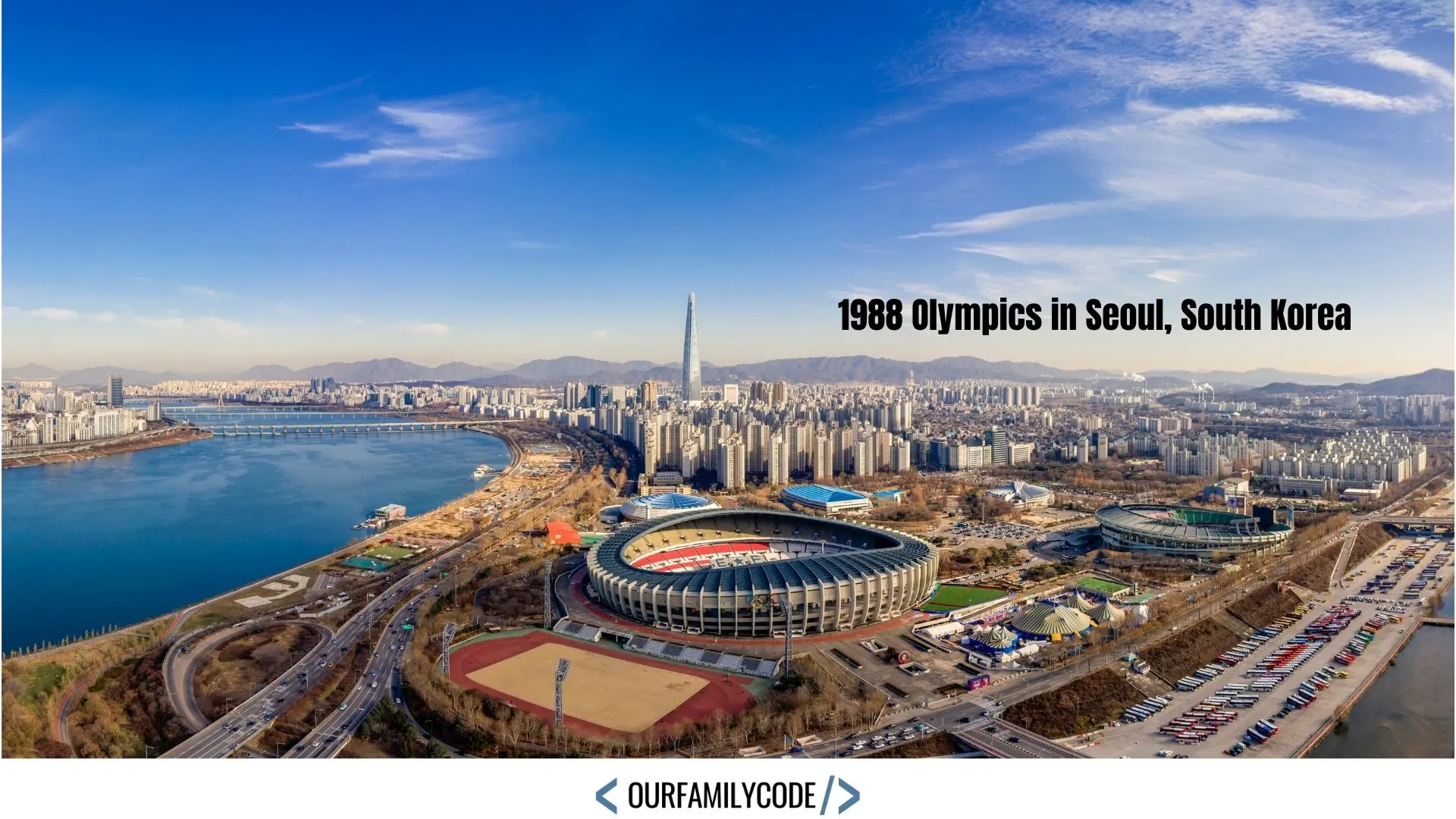
Barcelona, Spain – The 1992 Summer Olympics
The XXV Olympic Games were held from July 25 to August 9, 1992 in Barcelona, Catalonia, Spain. 1992 was the last year in which both Summer and Winter Olympic Games were held since they moved to an alternating even-numbered year format beginning in 1994.
The 1992 Summer Olympic Games hosted 9,356 athletes from 169 participating countries and awarded medals in 257 events. The Basketball event opened to allow professional players to compete and the United States sent the “Dream Team” to Barcelona. The Dream Team players included: Magic Johnson, Michael Jordan, and Larry Bird who ultimately won the gold medal in the event.
Twelve of the fifteen former Soviet republics competed under the Olympic Flag as the Unified Team. The Unified Team ranked first with 45 gold medals and 112 Olympic medals total. The United States ranked second with 37 gold medals, 34 silver medals, and 37 bronze medals.
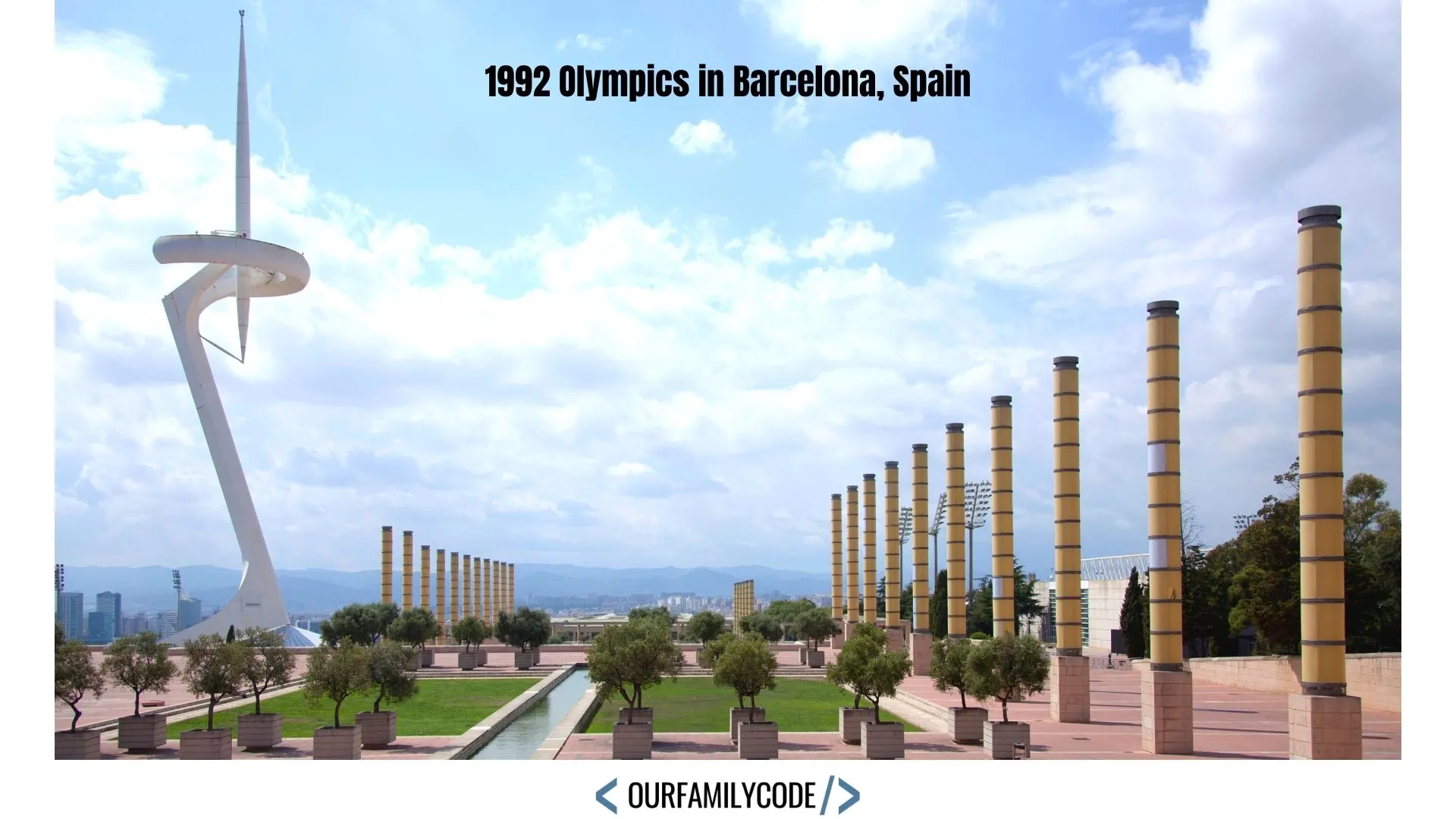
Atlanta, Georgia USA – The 1996 Summer Olympics
The 1996 Summer Olympics were held in Atlanta, Georgia. The Centennial Olympic Games featured 10,318 athletes from 197 participating countries and awarded medals in 271 events.
The Olympic Program added beach volleyball, mountain biking, lightweight rowing, and women’s football to the events. Michael Johnson from the United States became the first man in Olympic history to win both the 200m and 400m races and set the world record with 19.32 seconds in the 200m.
The United States ranked first with 44 gold medals and a total of 101 Olympic medals overall. This was the first time that the United States ranked first since 1984.

Sydney, Australia – The 2000 Summer Olympics
The XXVII Olympic Games were held in Sydney, New South Wales, Australia from September 15 to October 1, 2000. The 2000 Summer Olympics were the second Games that Australia hosted. For the first time, tests to detect EPO were conducted and blood samples were taken in an effort to prevent doping.
The Sydney Olympic Games featured 10,651 athletes from 199 participating countries and awarded medals in 300 events. The Sydney Games added the triathlon and Taekwondo events to the Olympic program as well as women’s weightlifting and modern pentathlon events.
The United States ranked first with 37 gold medals and a total of 93 Olympic medals overall. Russia had the second-most gold medals with 32 gold medals. China ranked third with 28 gold medals.
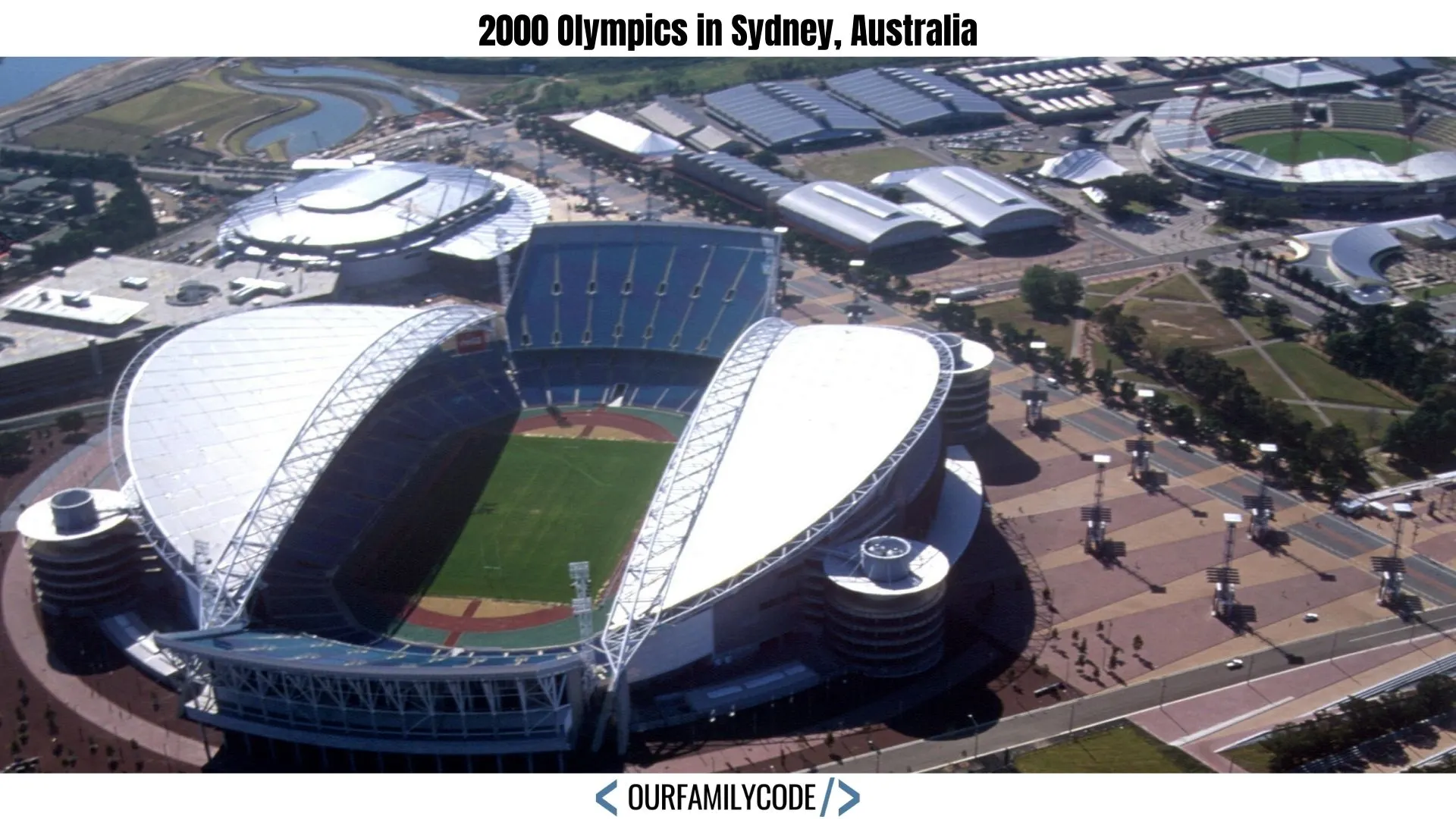
Athens, Greece – The 2004 Summer Olympics
The XXVIII Summer Olympics were held from August 13 to August 29, 2004 in Athens, Greece. The 2004 Summer Olympics featured 10,625 athletes from 201 participating countries and awarded medals for 301 events. The Games were widely watched via television with 3.9 billion television viewers.
The Ancient Olympia stadium was renovated for the shotput competitions and the Panathenaic Stadium hosted the archery and served as the end of the marathon events.
The United States ranked first with 36 gold medals and a total of 101 Olympic medals overall. China had the second-most gold medals with 32 gold medals. Russia ranked third with 28 gold medals.
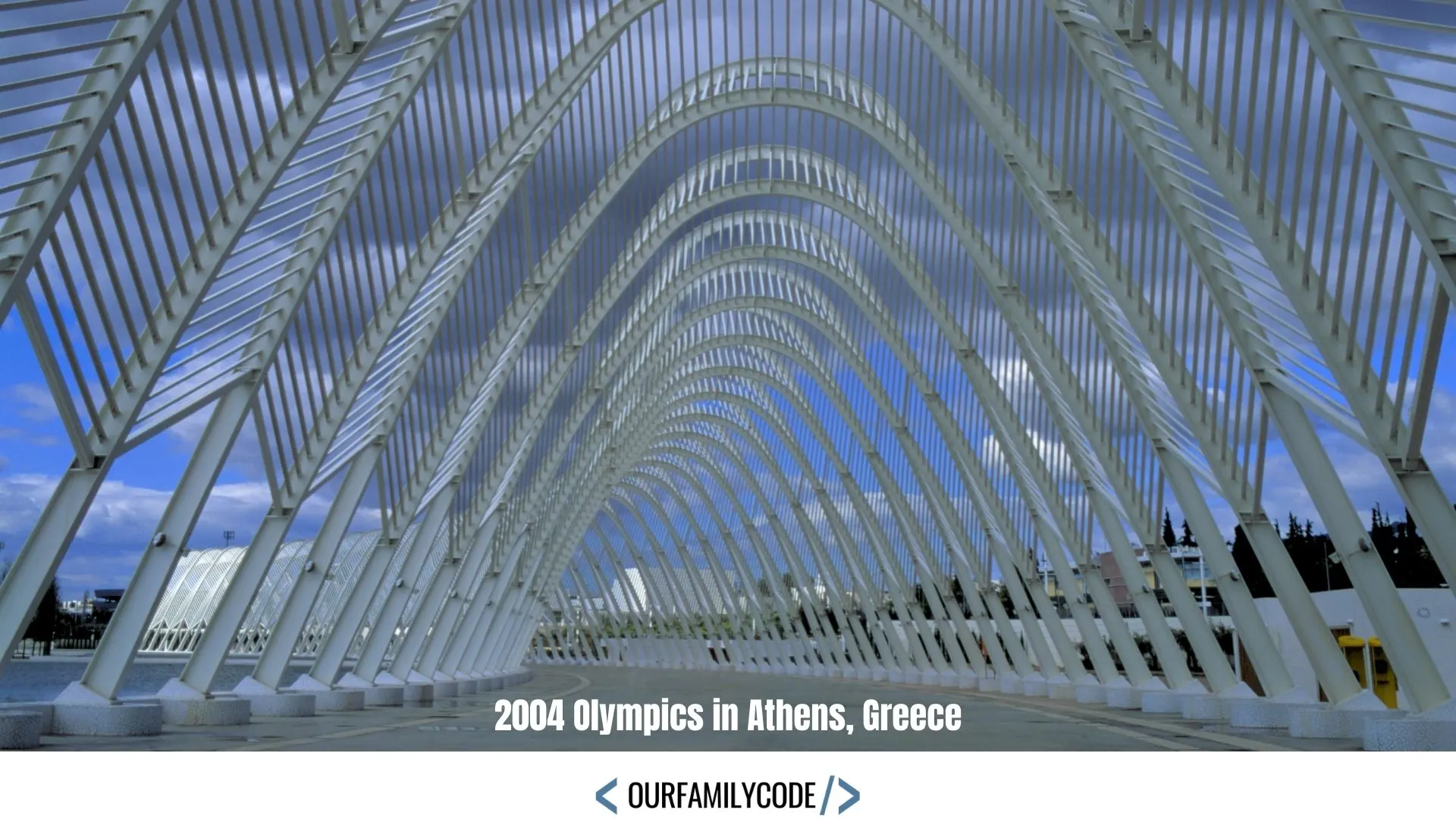
Beijing, China – The 2008 Summer Olympics
The XXIX Olympic Games were held from August 8 to August 24, 2008 in Beijing, China. The 2008 Summer Olympics featured 10,942 athletes from 204 participating countries and awarded medals for 302 events.
The National Stadium, called the Bird’s Nest was designed by architects Jacques Herzog and Pierre de Meuron in collaboration with Li Xinggang of China Architecture Design and Research Group.
Team USA swimmer, Michael Phelps, won eight gold medals, more than any other athlete in a single Olympic Games and set several world and Olympic records during his events. American gymnast, Nastia Liukin won the all-around gold medal in artistic gymnastics becoming the third American woman to do so behind Mary Lou Retton in 1984 and Carly Patterson in 2004.
The United States ranked second with 36 gold medals and had a total of 112 Olympic medals overall. China had the most gold medals with 48 gold medals. Russia ranked third with 24 gold medals.
Beijing has been selected as the host of the 2022 Winter Olympics, making it the first city ever to host both a Summer and Winter Olympic Games.
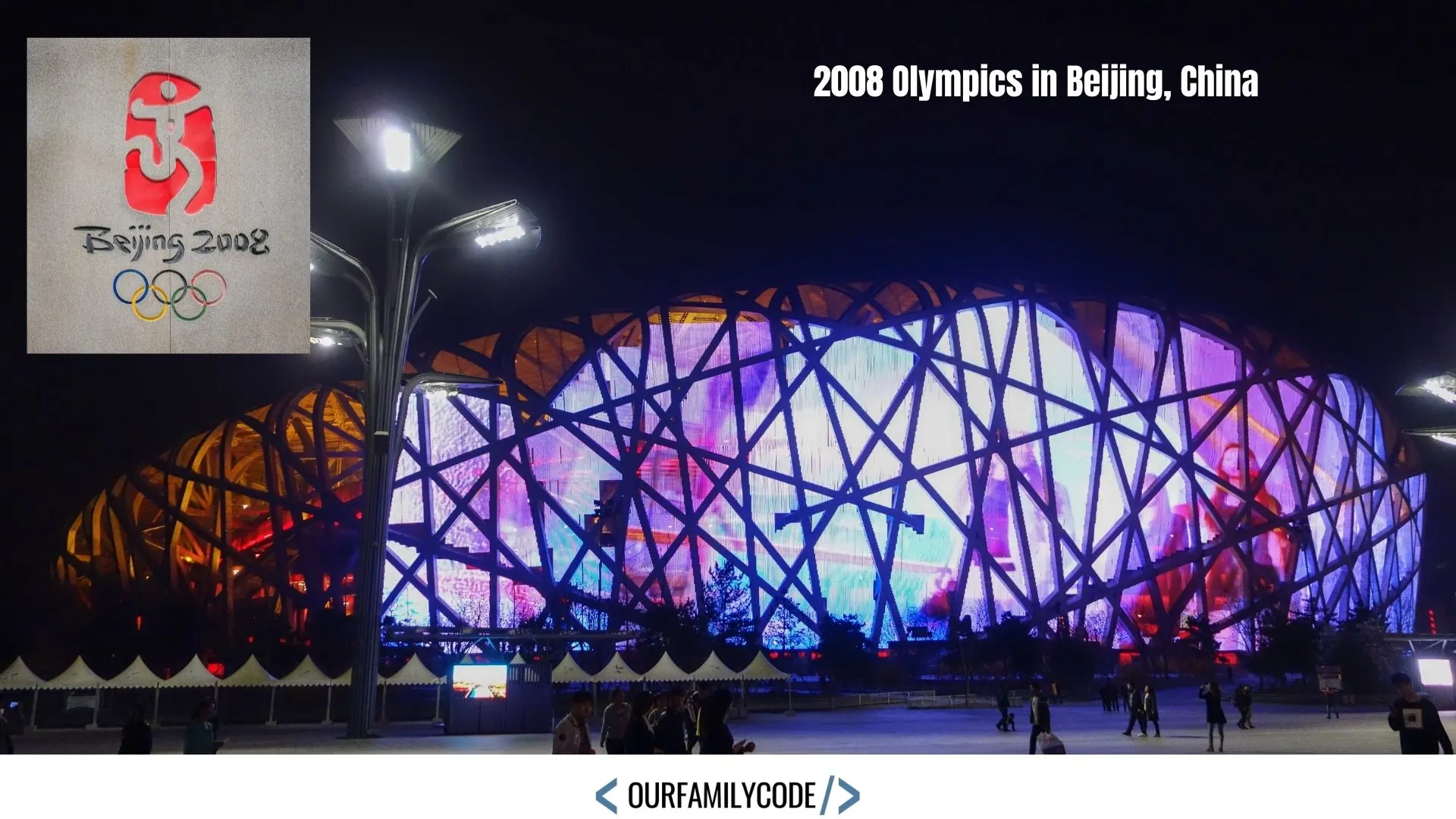
London, Great Britain – The 2012 Summer Olympics
The XXX Summer Olympics were held from July 27 to August 12, 2012 in London, Great Britain. The Games hosted 10,568 athletes from 204 participating countries and awarded medals for 302 events.
The 2012 London Olympics was the first time that a city was chosen to host three Olympic Games. London first hosted in 1908 and then again in 1948 before being chosen again to host the 2012 Olympics.
During the 2012 Games, Michael Phelps became the most decorated Olympic athlete of all time, winning his 22nd medal.
The United States was the top ranking country with 46 gold medals and 104 Olympic medals overall. China ranked second with 38 gold medals and Great Britain ranked third with 29 gold medals.
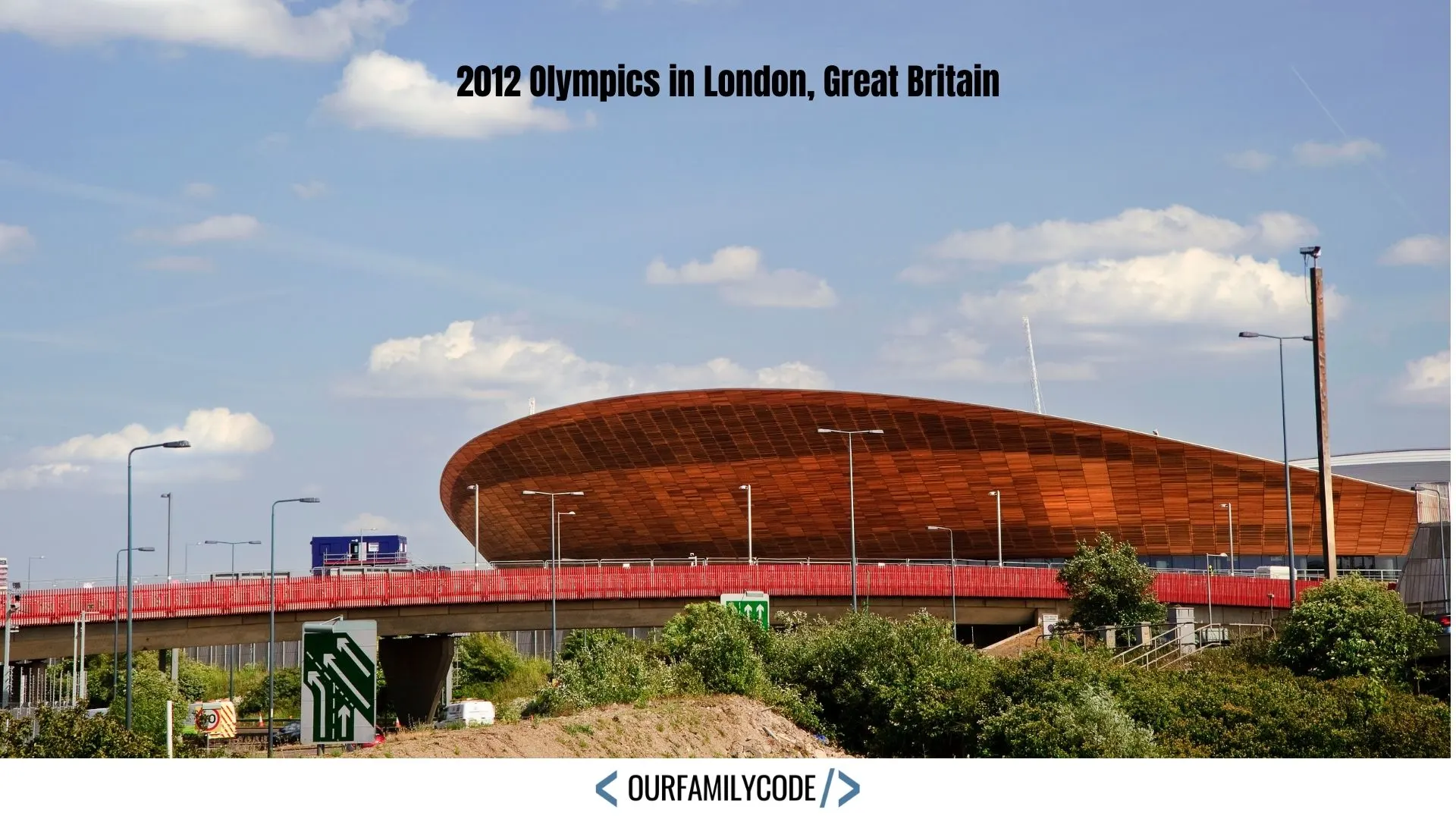
Rio de Janeiro – The 2016 Summer Olympics
The XXXI Summer Olympics were held from August 5 to August 21, 2016 in Rio de Janeiro, Brazil. The 2016 Olympic Games featured 11,238 athletes from 207 participating countries and awarded medals for 306 events.
Jamaican sprinter, Usain Bolt became the first athlete to win the 100m and the 200m at three consecutive Olympic Games. American swimmer Michael Phelps increased his Olympic medal record to 23 medals.
American gymnast, Simone Biles won four gold medals including the all-around award for artistic gymnastics, the vault event, and floor exercise event in addition to her gold medal from the Women’s Gymnastics Team win. She also won a bronze medal in the beam event. Her teammate, Aly Raisman, won the silver medal for all-around artistic gymnastics.
The United States topped the medal chart with 46 gold medals and 121 Olympic medals overall. Great Britain ranked second with 27 gold medals and China ranked third with 26 gold medals.
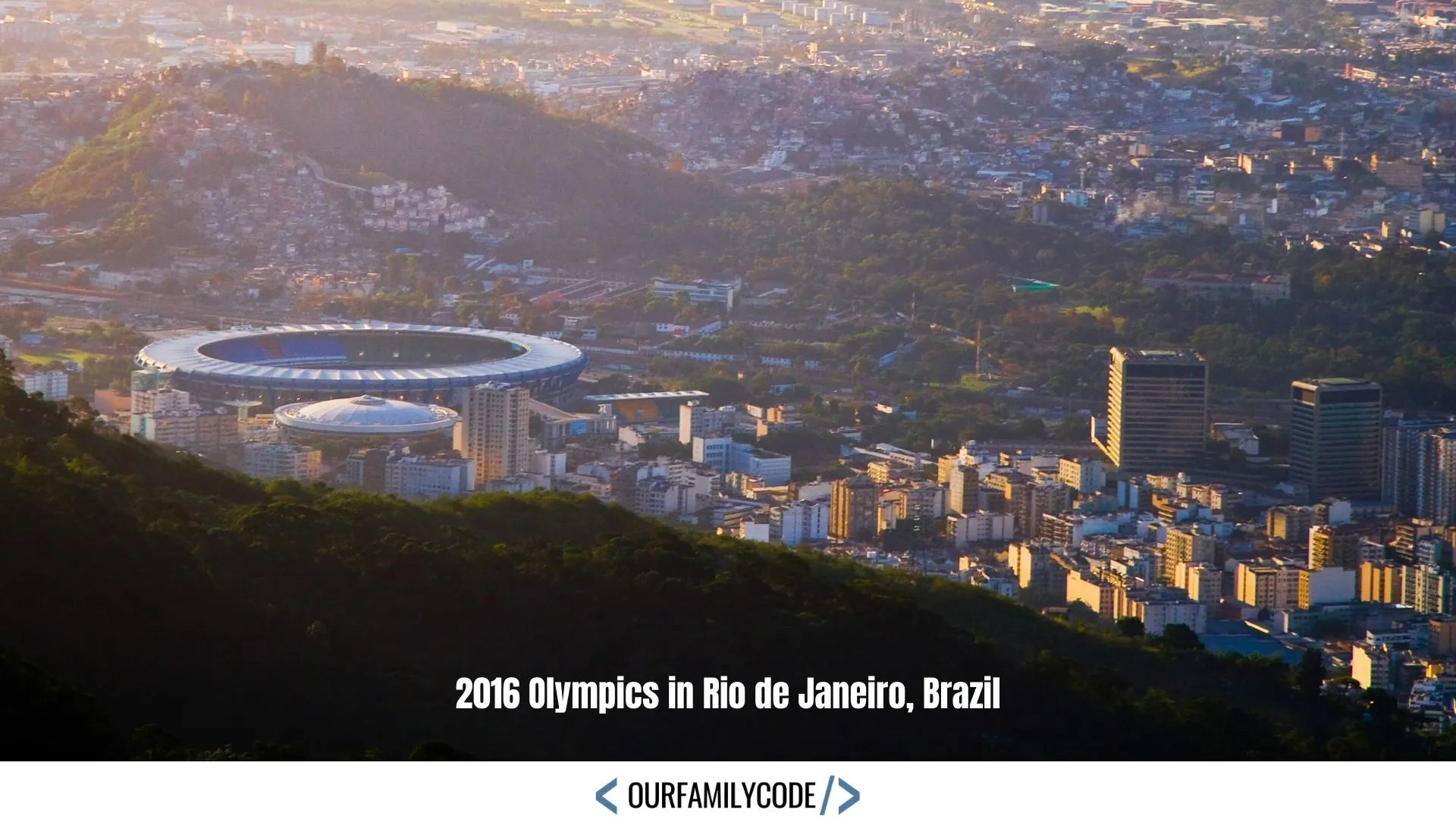
Tokyo, Japan – The 2020 Summer Olympics
The 2020 Summer Olympics were originally scheduled to be held from July 21 to August 8, 2020 in Tokyo, Japan. As a result of the COVID-19 pandemic, the Games were postponed to 2021 making them the first Olympic Games to be rescheduled rather than cancelled.
Due to the ongoing coronavirus pandemic and the state of emergency in Tokyo, Japan, the events will occur with no spectators permitted. The 2020 Games will add several new sports to the Olympic program including: karate, sport climbing, surfing, and skateboarding. Baseball and softball will also return as events for the first time since 2008.
Team USA gymnast Simone Biles is the most decorated American gymnast of all time with a combined total of 30 Olympic and World Championship medals. Biles is hoping to make history by winning the gold medal in the all-around event by becoming the first female gymnast in half a century to defend her title. She is also aiming to win four medals of any color to take her Olympic and World Championship medal tally to 34, which would make her the most decorated gymnast of all time, whether male or female.

Paris, France – The 2024 Summer Olympics
The 33rd Summer Olympic Games are scheduled to take place from July 26 to August 11, 2024 in Paris, France. Paris will become the second city to host the Olympics three times after London.
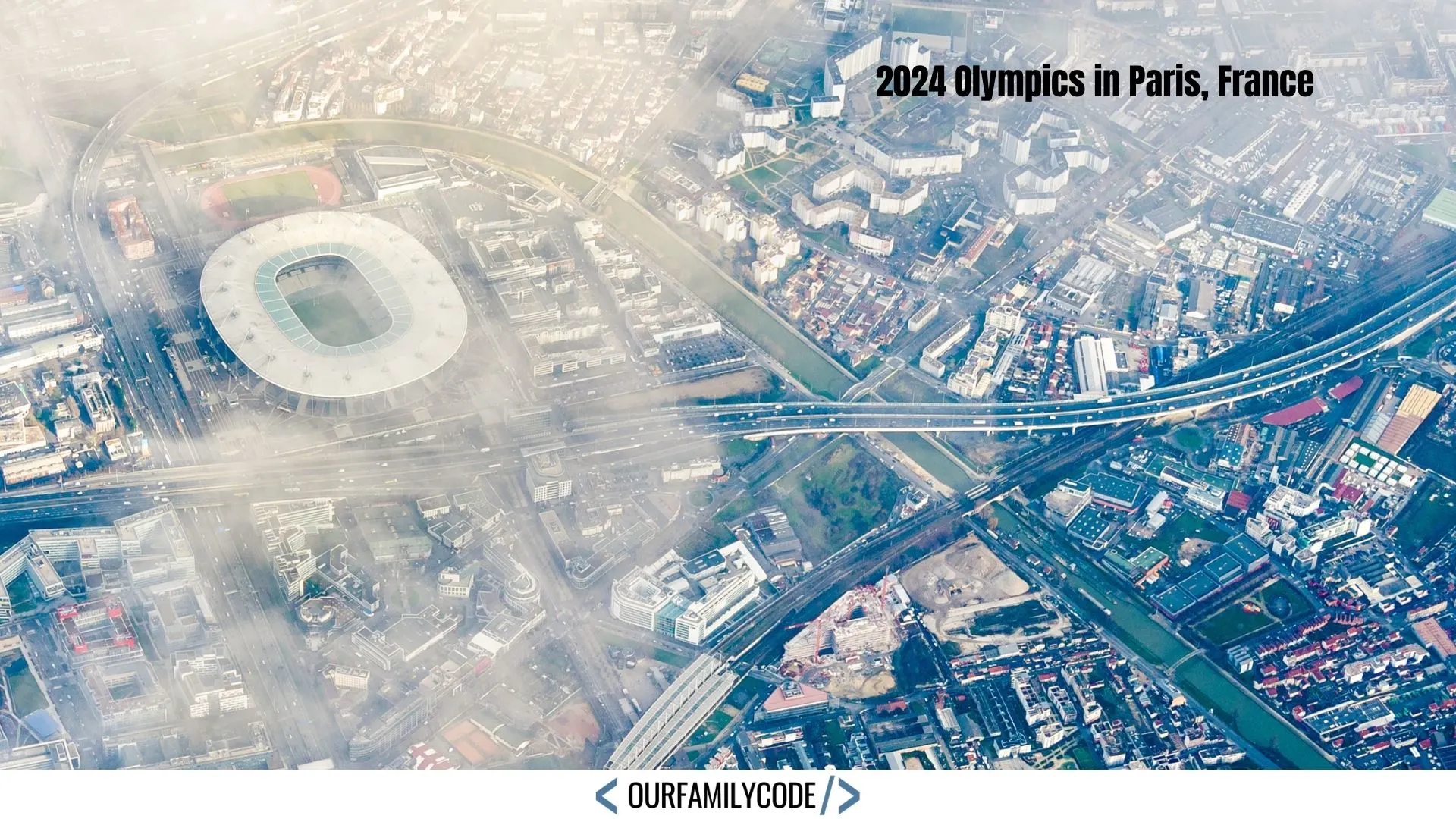
Los Angeles, California USA – The 2028 Summer Olympics
The XXXIV Summer Olympics are scheduled to take place from July 21 to August 6, 2028 in Los Angeles, California, USA. Los Angeles will become the third city to host the Games three times and the 9th Olympics to be held in the United States overall.
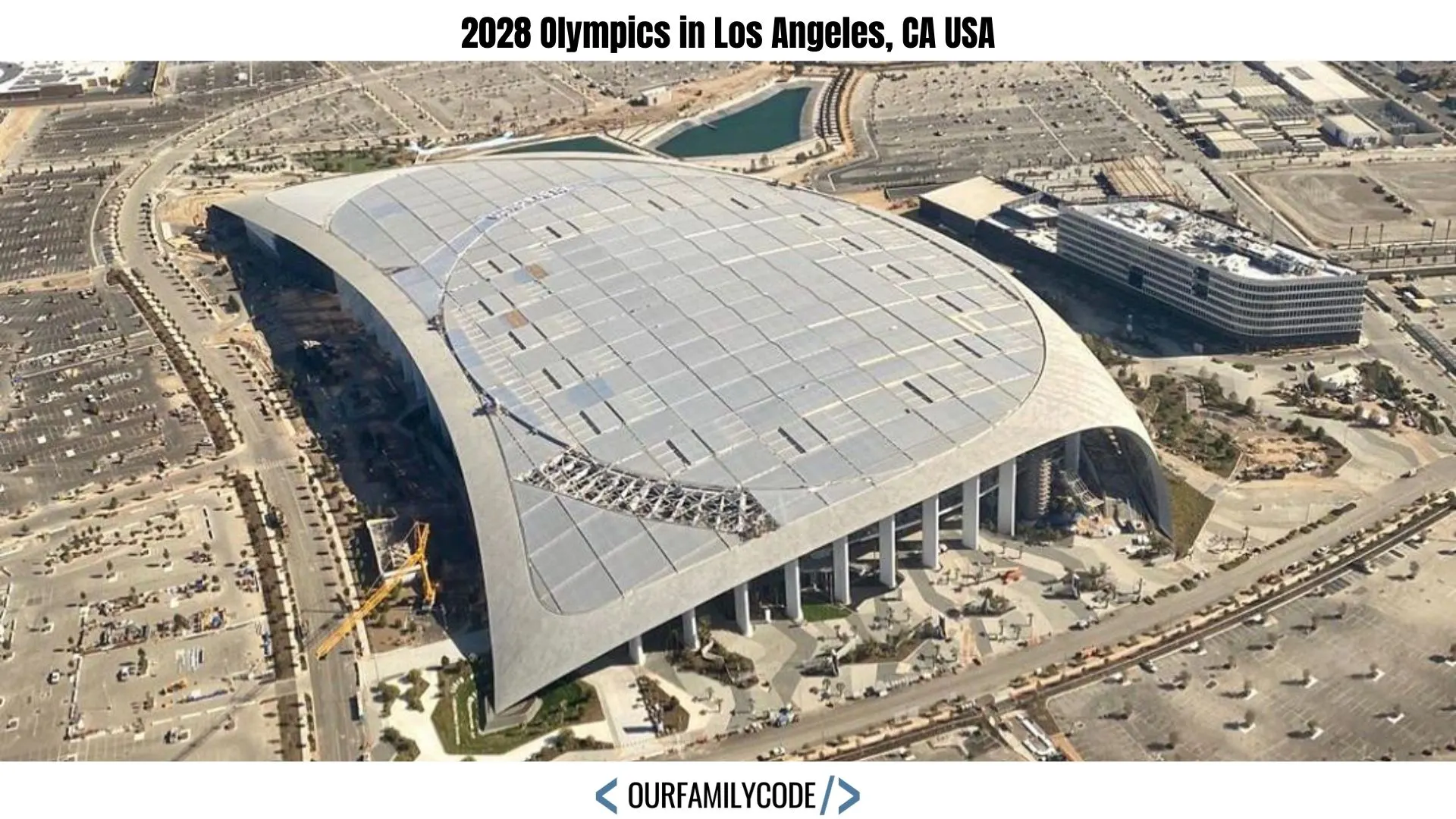
Brisbane, Australia – The 2032 Summer Olympics
It is expected that the 2032 Summer Olympics will be held in Brisbane, Australia. The 35th Olympiad is expected to occur between July 23, 2032 and August 8, 2032. The host of the 2032 Summer Olympic will be announced by the International Olympic Committee on the eve of the 2020 Summer Olympics.
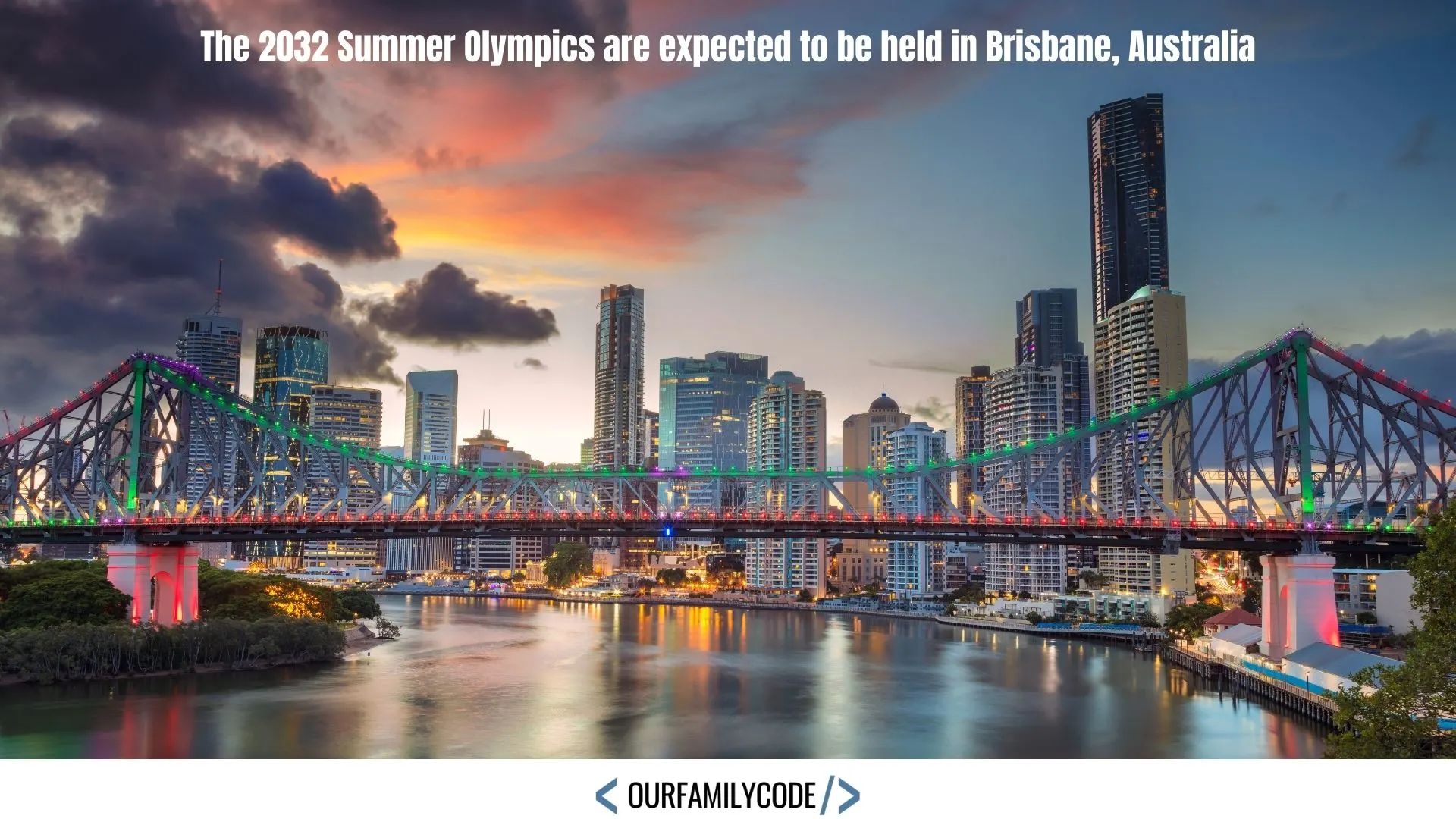
Map the Olympic Host Cities Geography Activity for Kids
This world geography activity challenges kids to use technology to map the Summer Olympic host cities since the Olympics started in 1896.
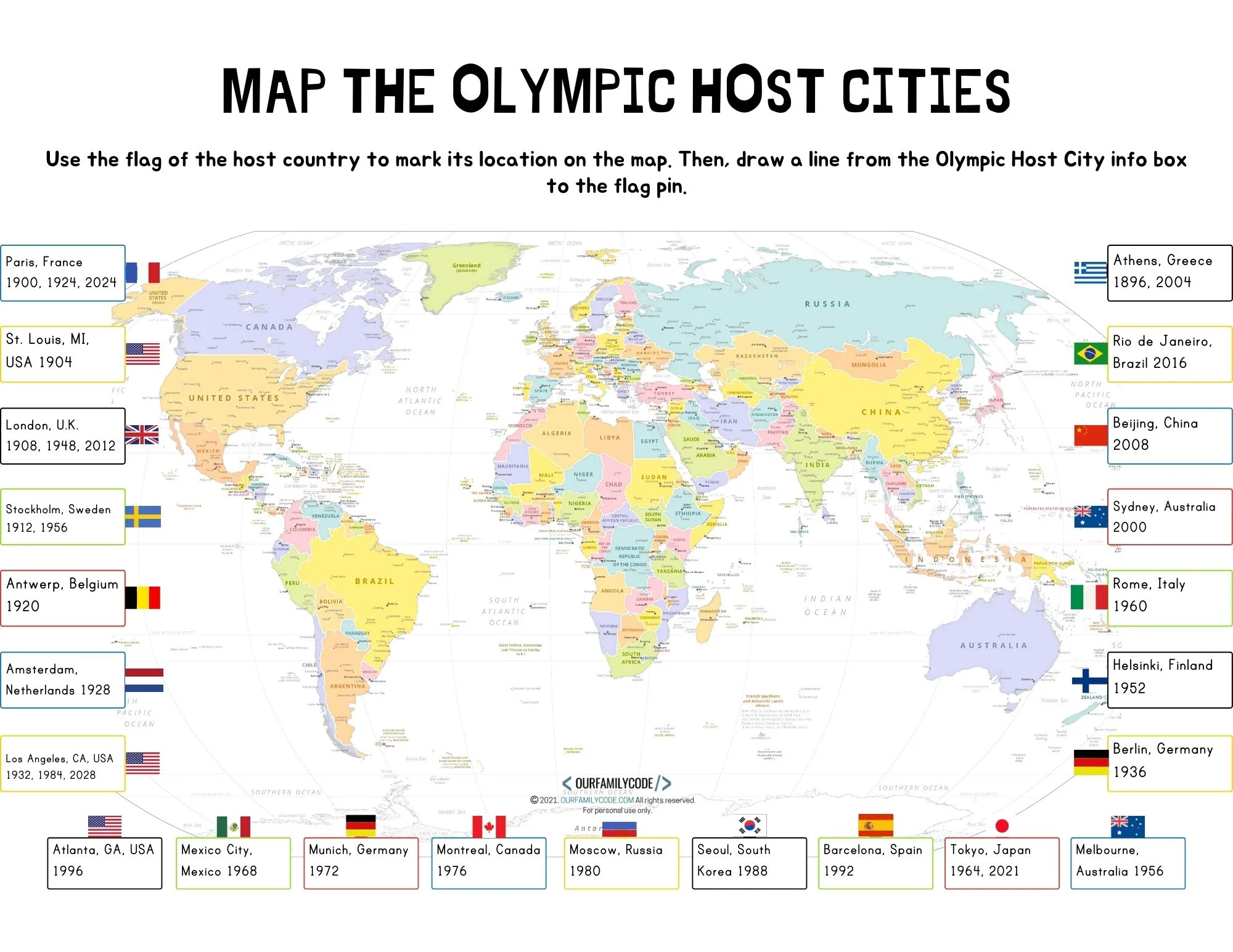
This post contains affiliate links. As an Amazon Associate, Our Family Code earns from qualifying purchases. Please see our Disclosure Policy for more details.
Supplies Needed
- Map the Olympic Host Cities Workbook (grab this at the end of the post)
- 23 Push pins, small nails, or toothpicks
- Tape or glue stick
- Pencil
- 8×12 piece of cardboard or a cork board
Make Flags to Mark Country Locations
To get started, print the national flags of the Olympic Host Cities from the workbook. Be careful cutting out the flags for Japan, South Korea, and Russia because they each have white in the flag on the edge. Hold up to the light to see where the flag ends before cutting.
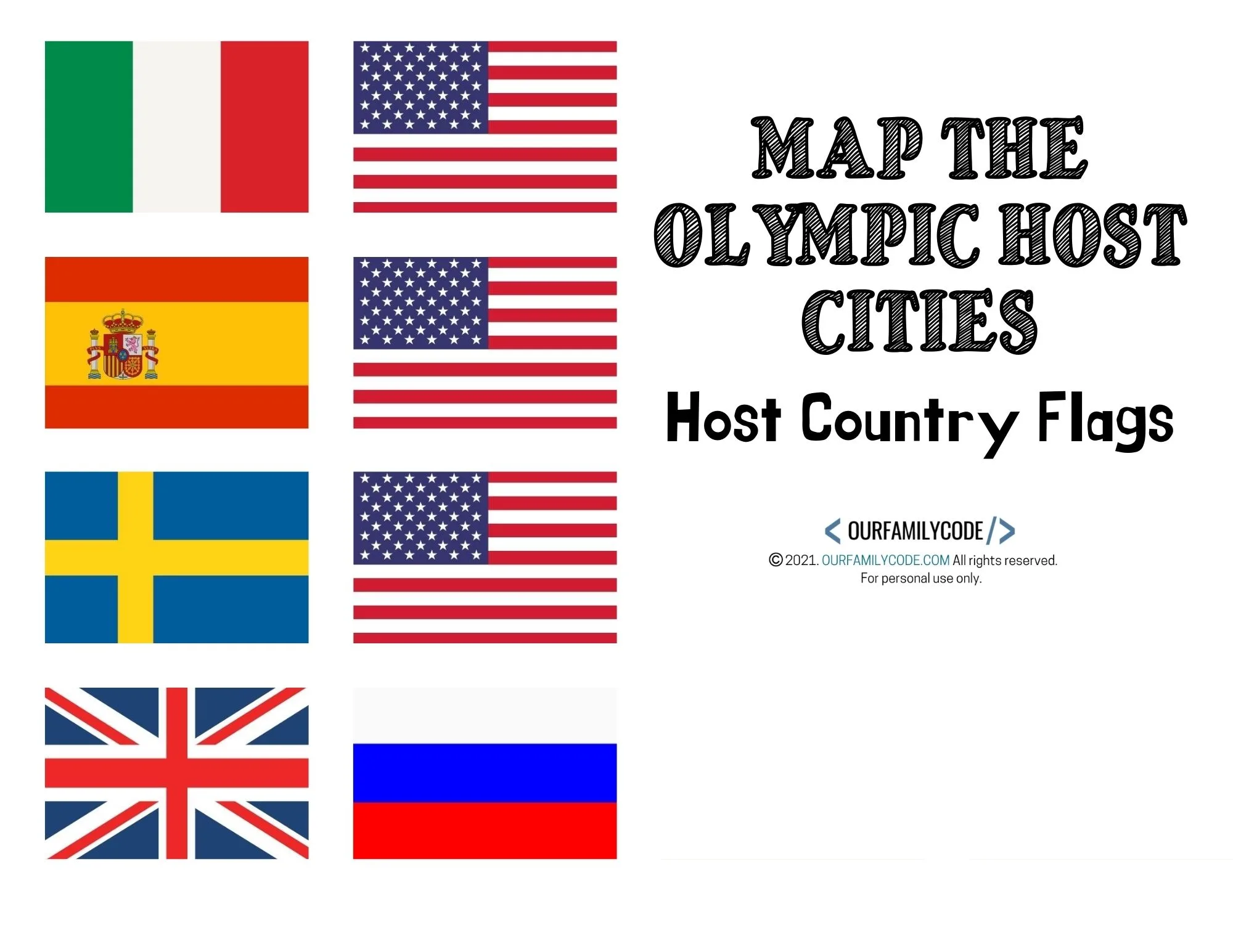
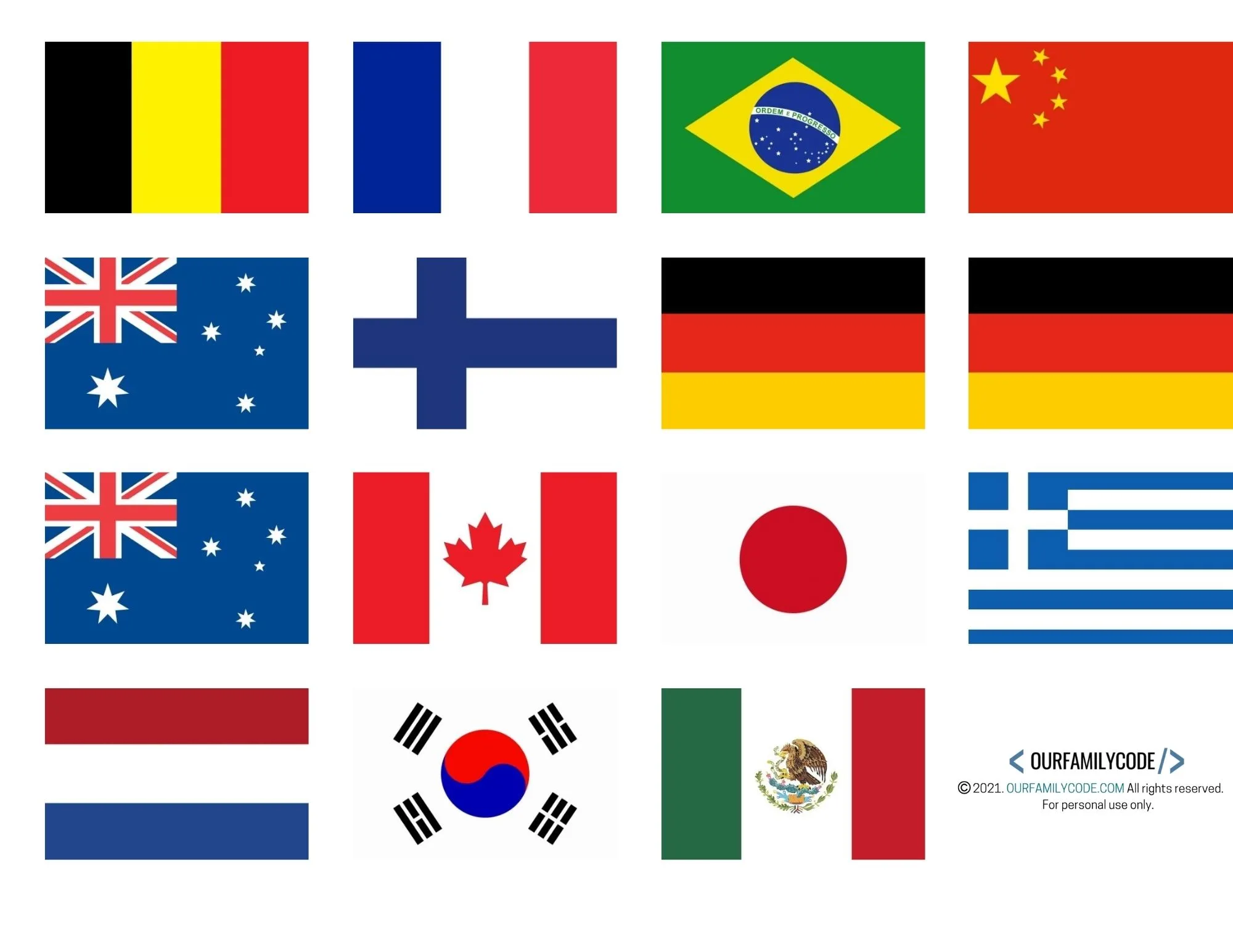
Make sure to leave the white space to the left of the flag in order to fold that paper over a pin to mark the locations of the countries on your map.
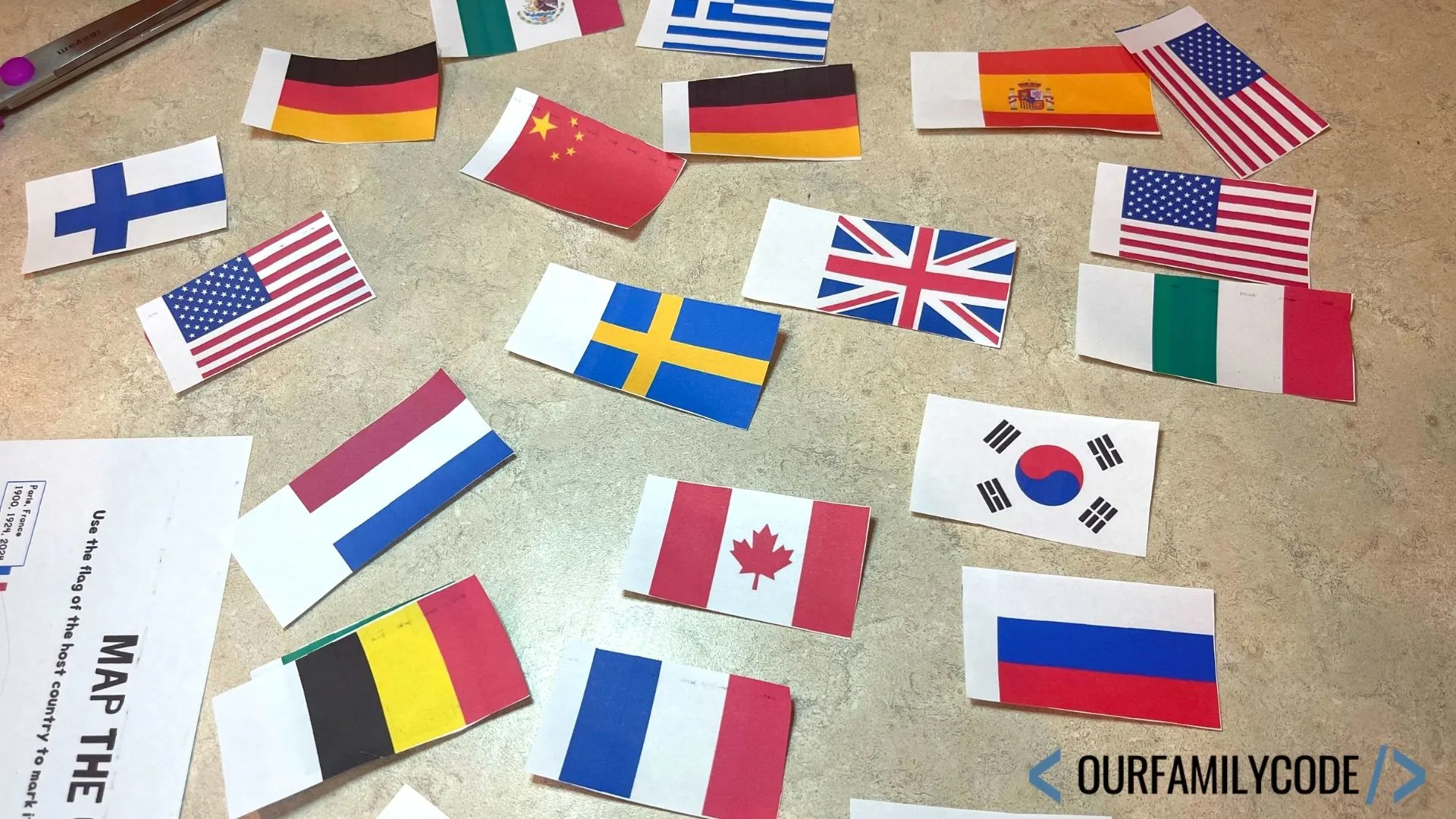
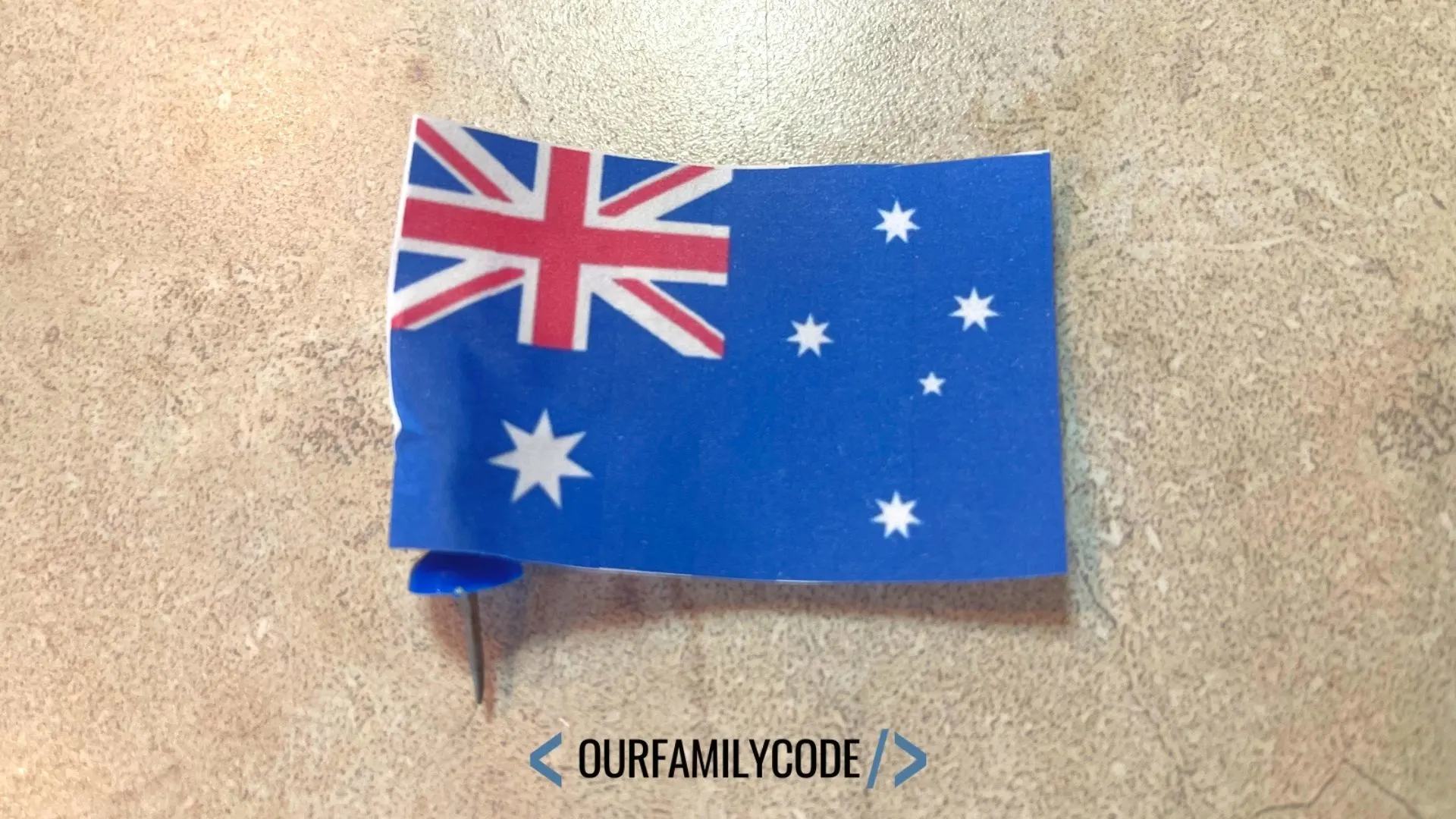
The push pins can be a little tricky to use. We started our activity with push pins and moved to small nails because we did not have toothpicks.
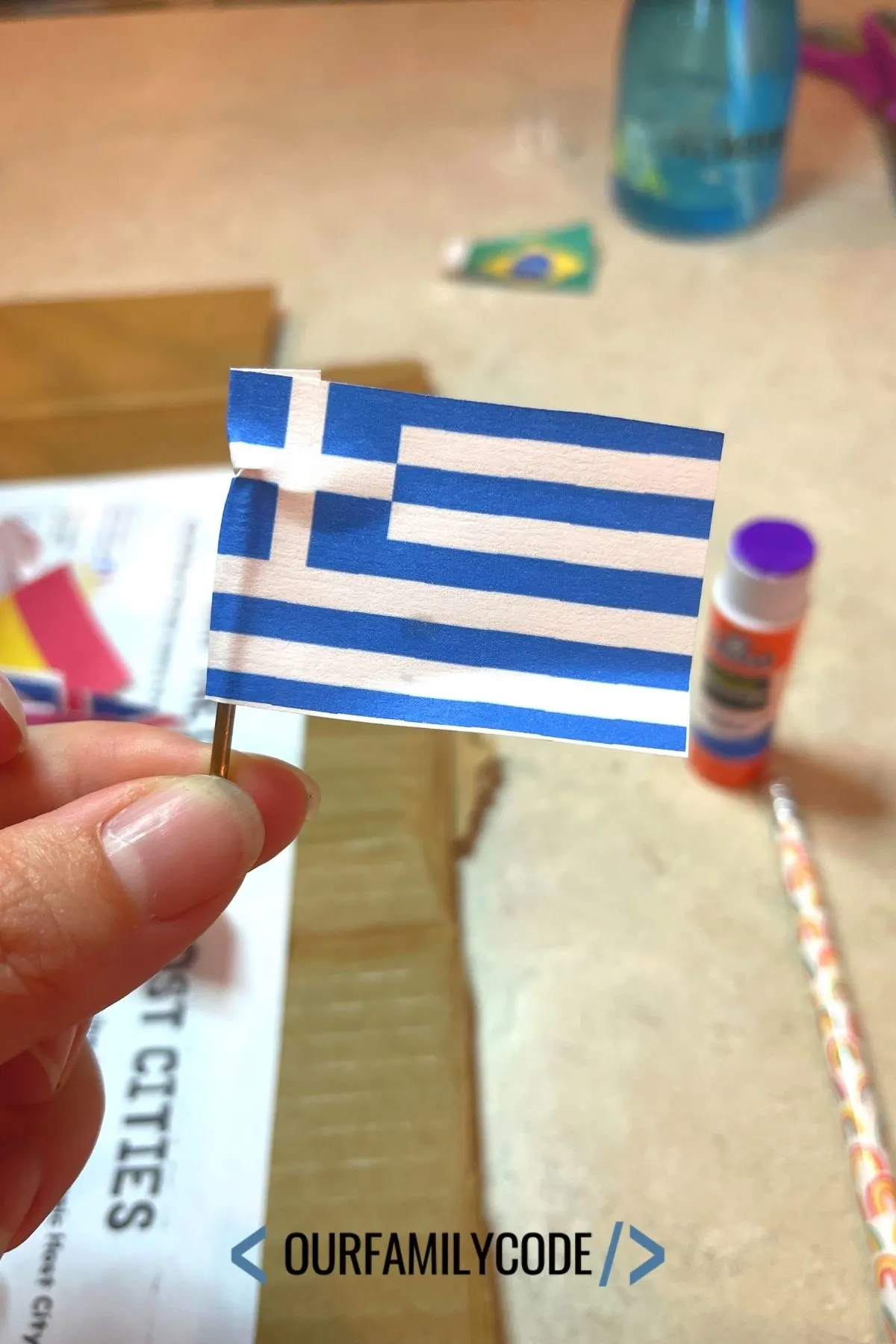
Use a large piece of cardboard to push the pins/toothpicks/small nails through the paper map for stability and to prevent from damaging any surfaces.
Identify the Locations of Host Countries
Use technology or carefully search the activity map to mark the locations of each host country using the flag pins. We used our large globe to hunt for the right countries then found them on the map.
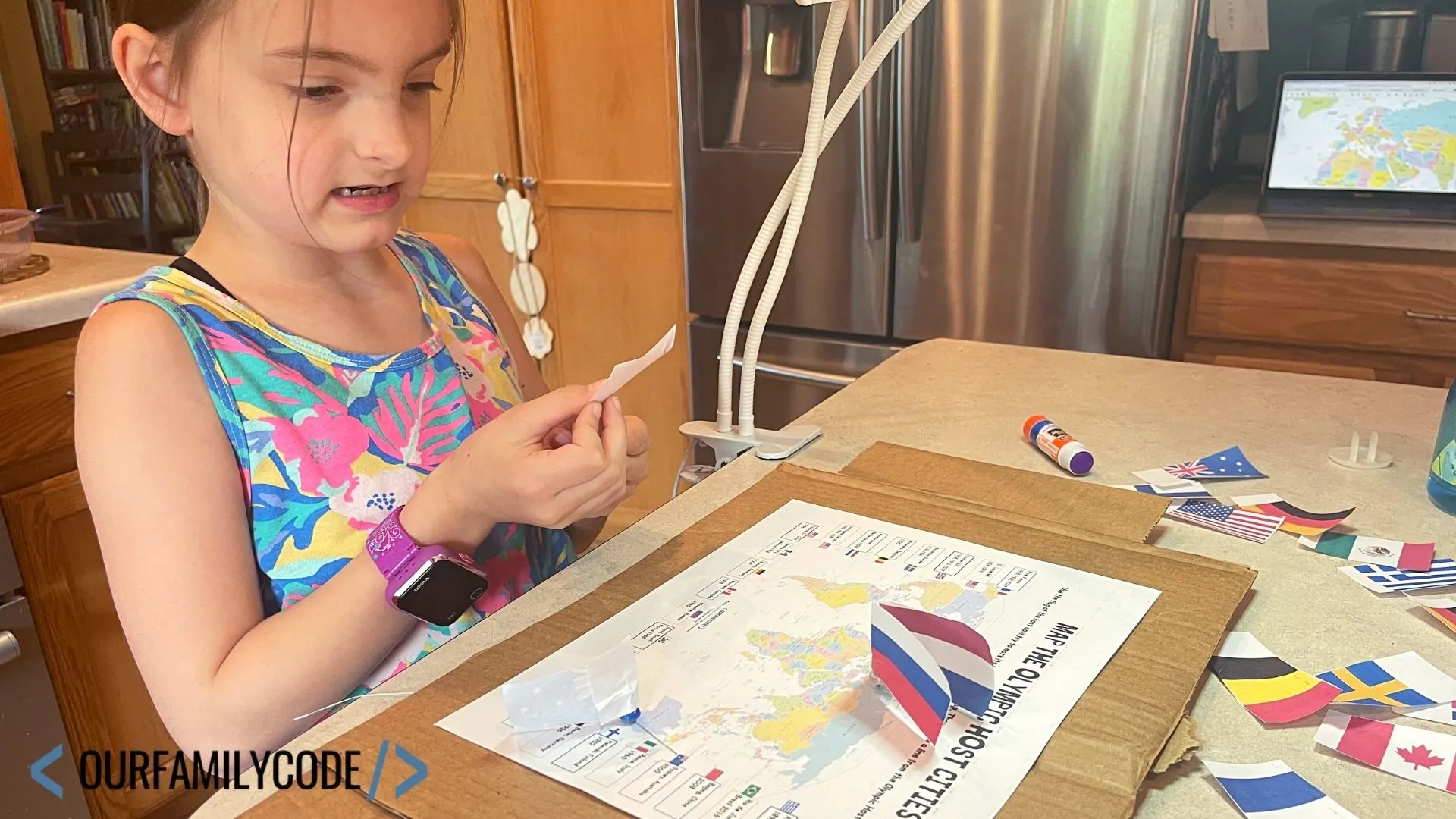
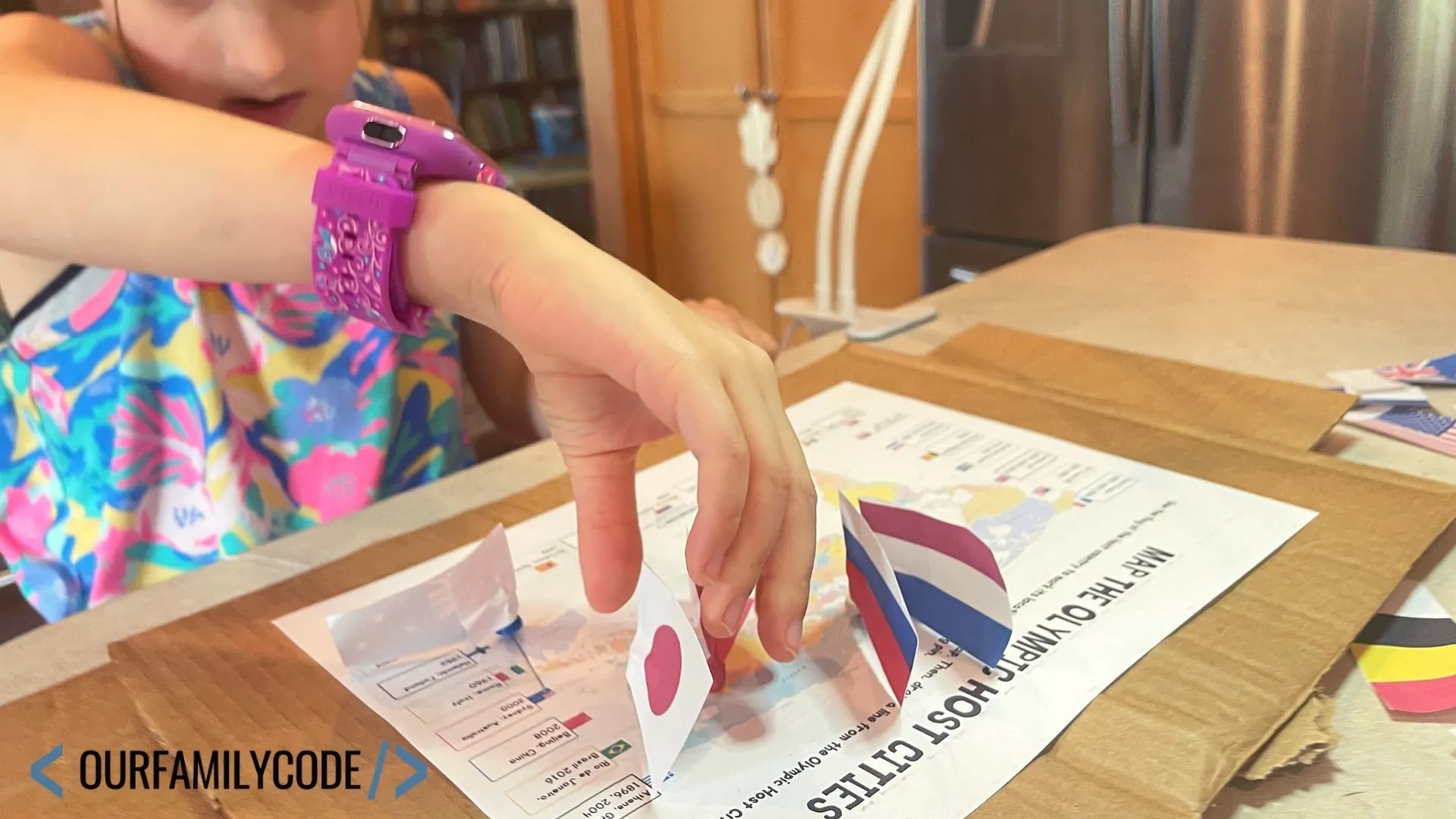
You will notice that you start to run out of space rather quickly in Europe. We ended up placing our flags in a circular way on that continent. The lack of space opened the door to making observations about where the most Olympic Games have been held and learning about the different continents.
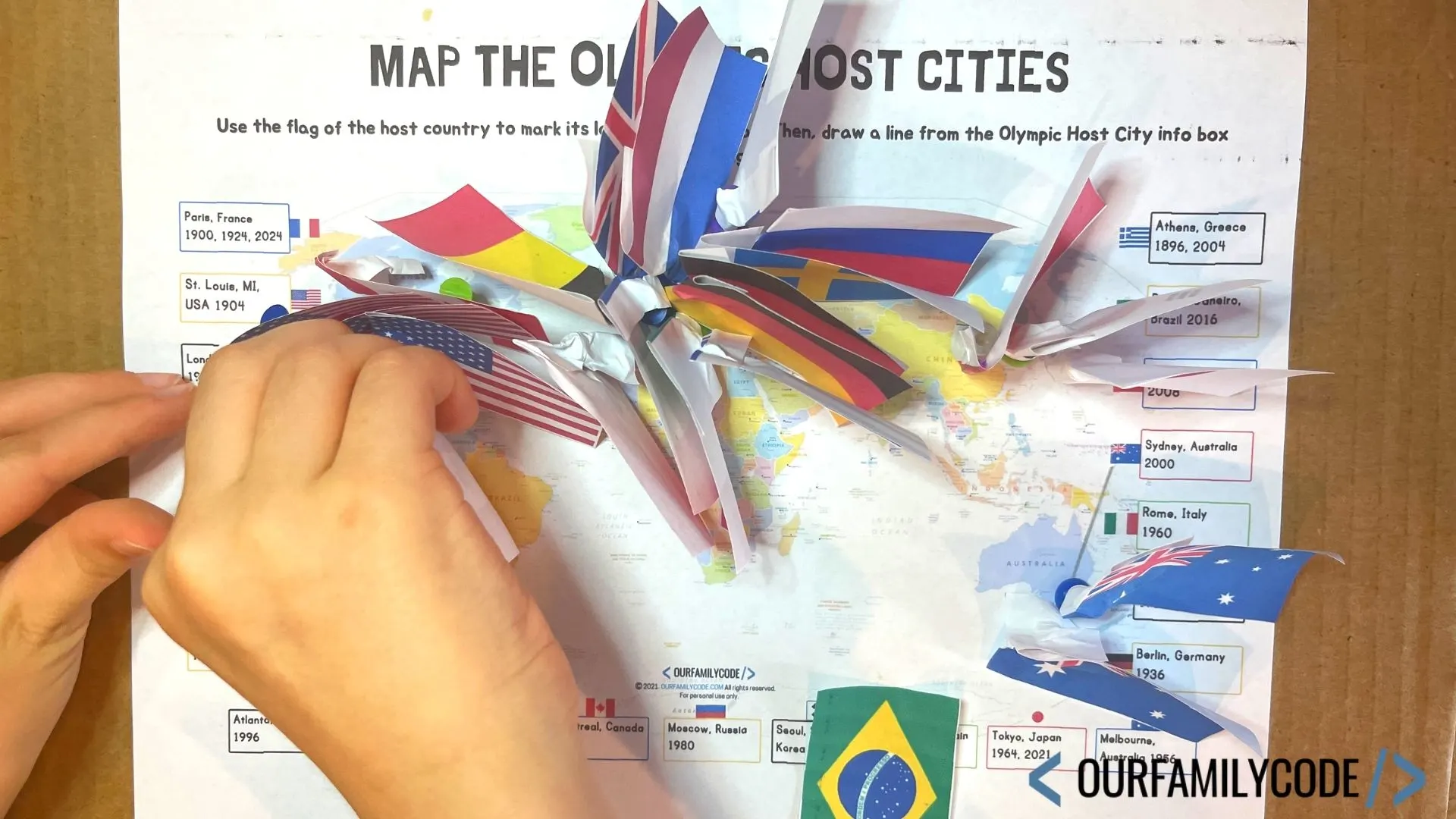
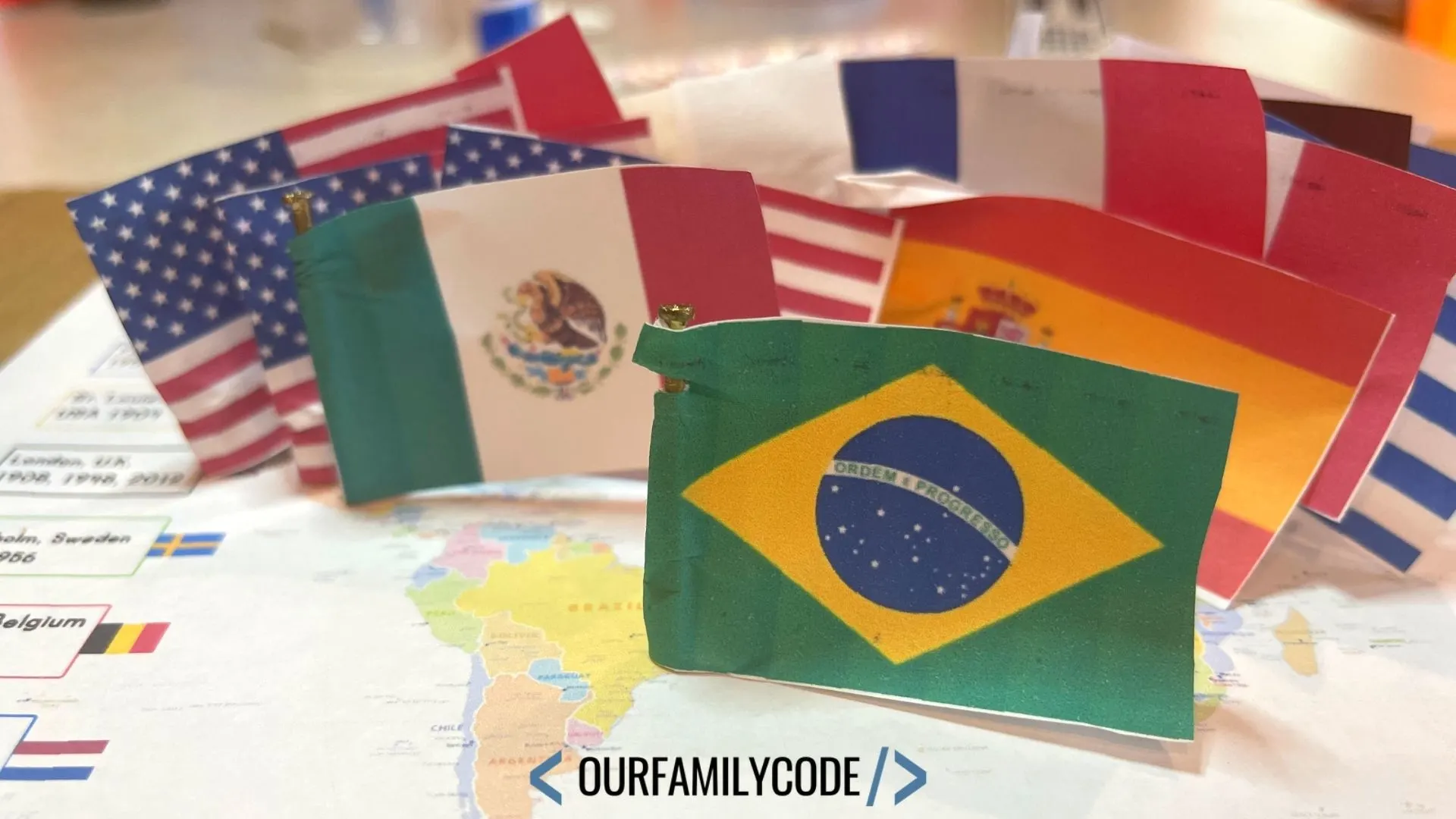

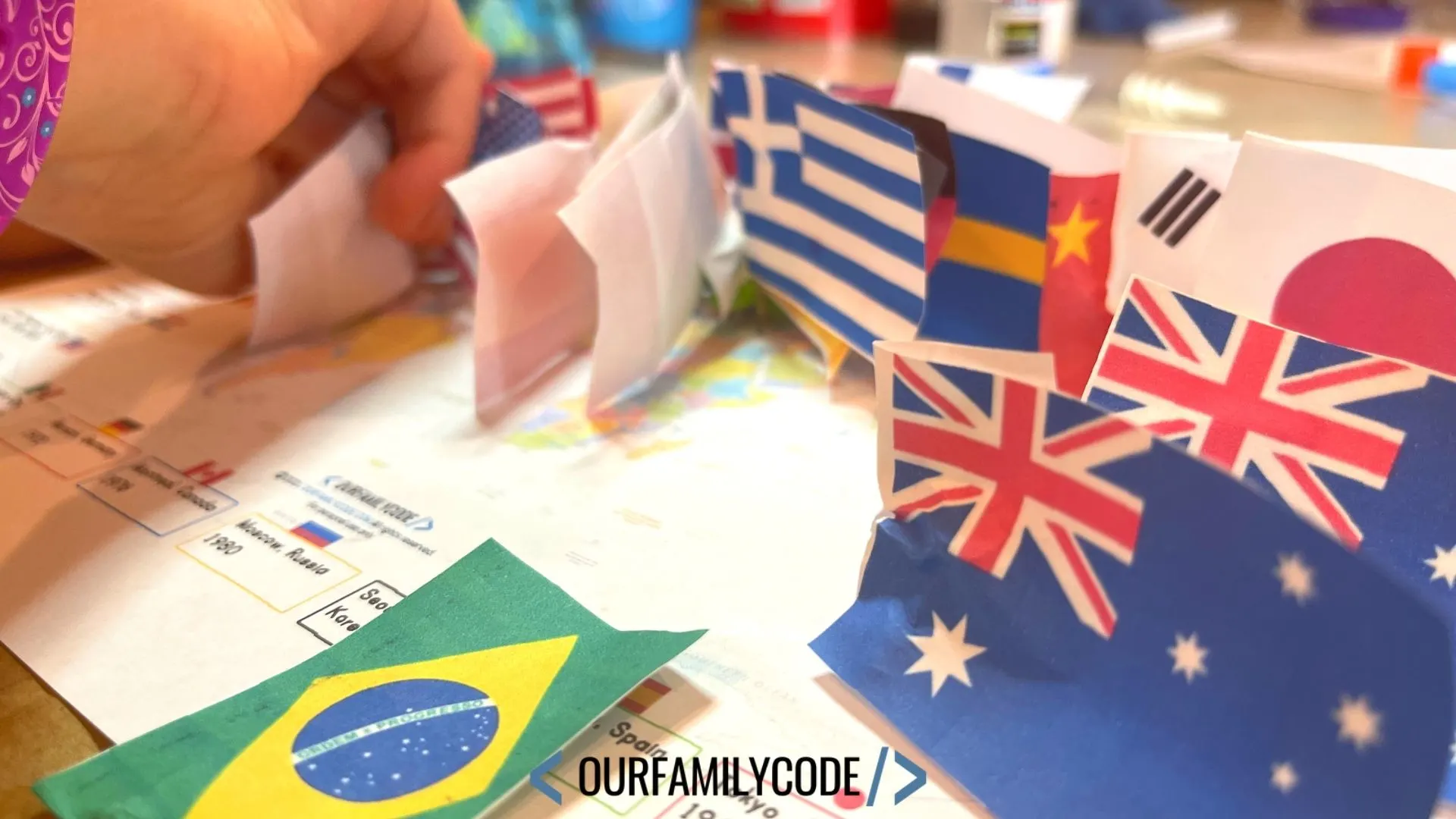
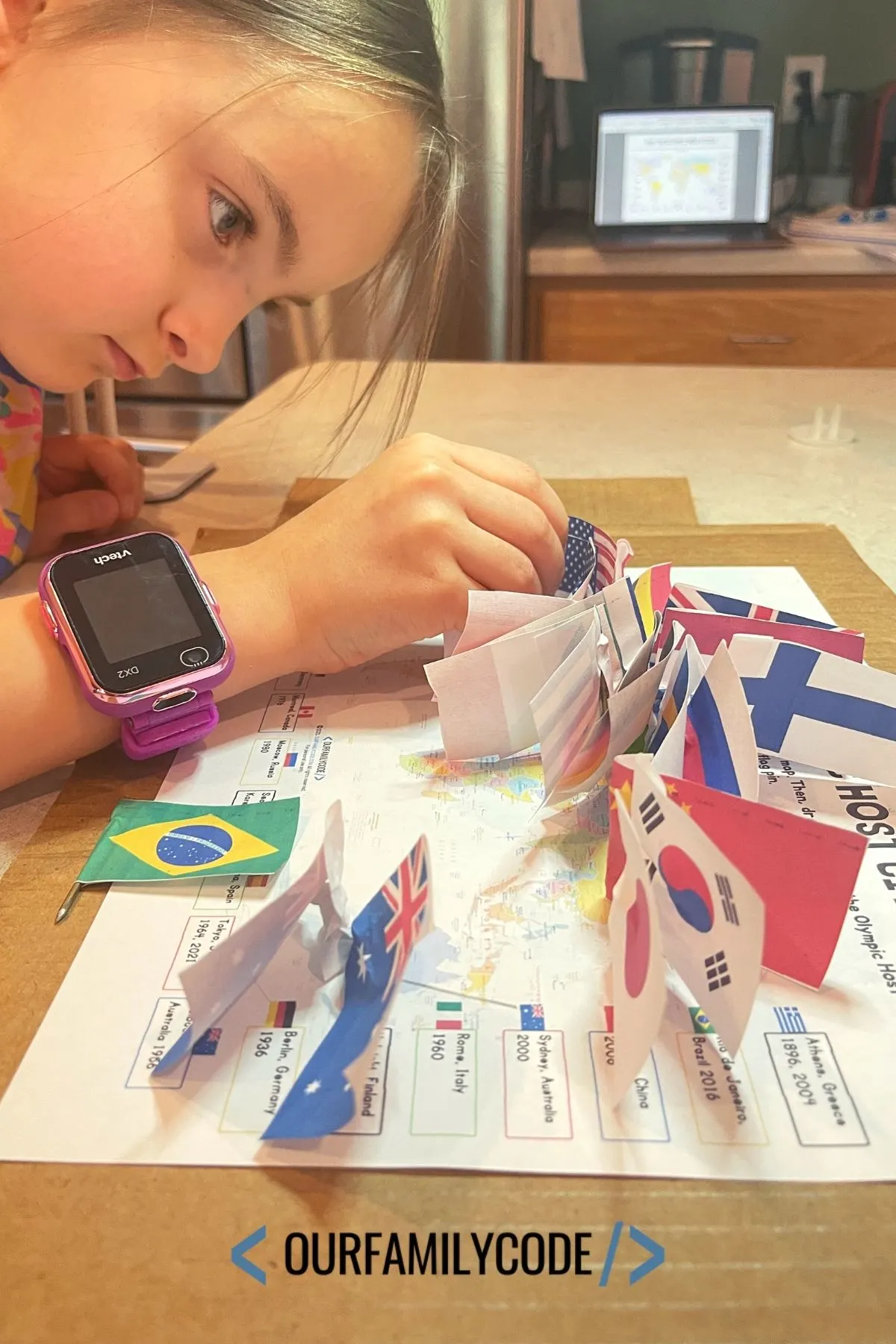
Map the Olympic Host Cities
You can also forego using the national flag markers and decide to use a pencil to draw a line from the Olympic Host City information boxes on the activity workbook to map the Olympic Host City information box to its correct location on the map.
Check the Answers
Did you map your host cities correctly? Check out the answer key in your workbook or take a look below!
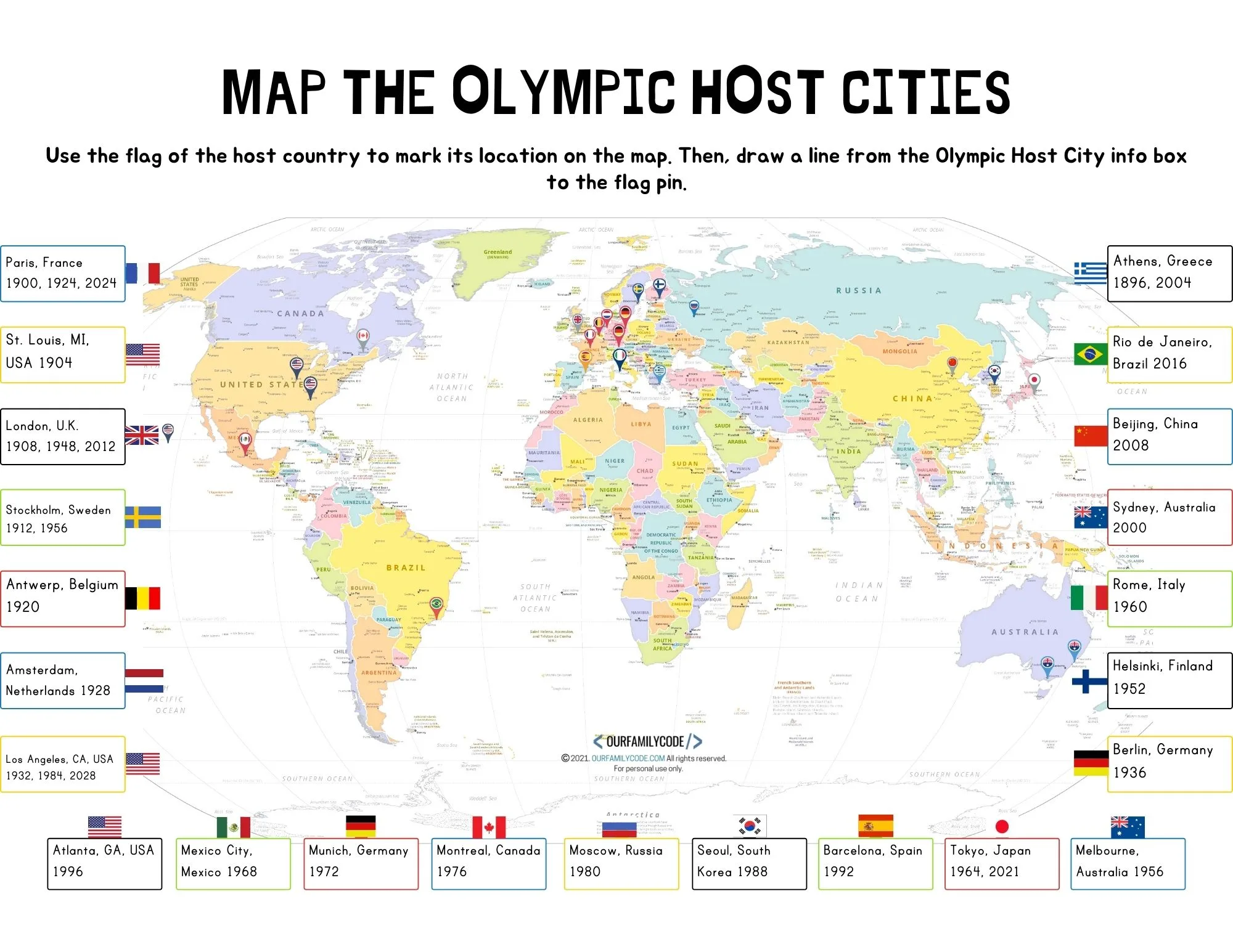
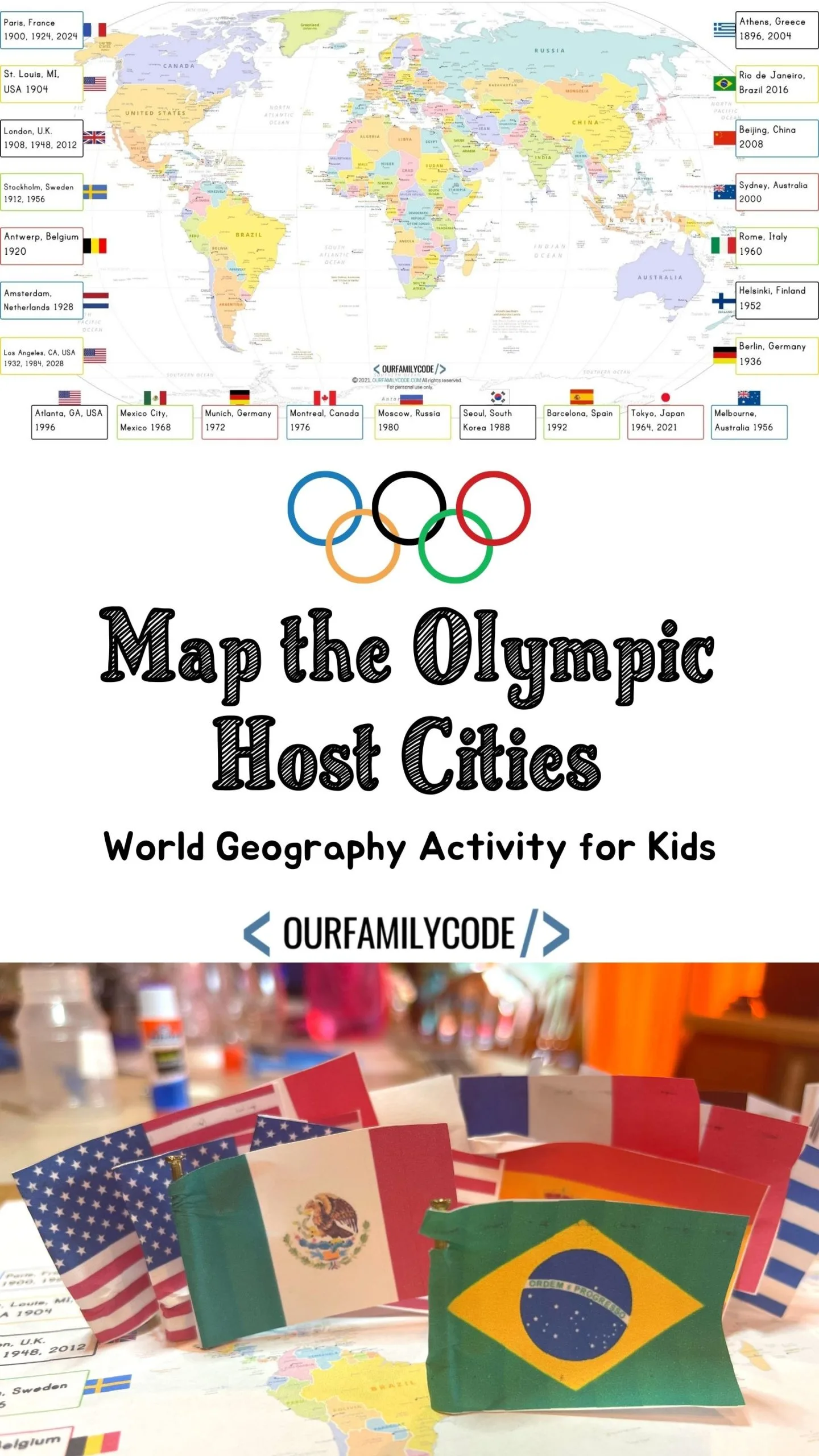
Olympic Games Activities for Kids
Find more hands-on learning activities that are perfect for learning about the Olympics!
Olympic Medal Ten Frames Worksheets for Kids
These Olympic medal ten frames math worksheets are fantastic to work on basic number facts with a fun Olympics twist for Pre-K to 1st grade!
Optimal Javelin Throw Angle Measurement & Graphing
Analyze the optimal javelin throw with this Summer Olympics optimal throw javelin angle measurement and graphing Sports STEM activity.
Frozen Baseball Experiment Sports STEM
Learn what happens when baseballs get cold and learn the history of how baseballs are made with this frozen baseball experiment Sport STEM activity!
Measure Athlete Angles in Olympic Sports
Athletes use angles to analyze their performance. This sports STEM activity challenges kids to measure athlete angles in Olympic Sports.
Olympic Hundreds Chart: Fill in the Olympic Rings
Practice number recognition and counting within 120 by placing the correct number inside the empty rings on this Olympic hundreds chart!
Team USA Medal Tracker Hundreds Chart to 130
Use this Team USA medal tracker to record each medal that Team USA wins during the Olympic Games and complete a hundreds chart to 130.
Map the Olympic Host Cities World Geography Activity
This world geography activity challenges kids to use technology to map the Olympic host cities since the Summer Olympics started in 1896.
Meet Toni, the Maker Mom behind Our Family Code

Hey there, I’m Toni! I’m a software engineer and Maker Mom that finds my joy in unleashing my children’s curiosity by exploring STEAM concepts with my fantastic five!
When I’m not chasing toddlers or raising tweens, you can find me tearing things up and putting them back together over here at Our Family Code.
I am the owner and content creator of multiple educational websites designed to increase access to STEAM & STEM education with a focus on teaching computer science and coding to kids of all ages!
You can also find out more about me by visiting ToniGardner.com!












